词汇 9-10
- 格式:doc
- 大小:71.00 KB
- 文档页数:10
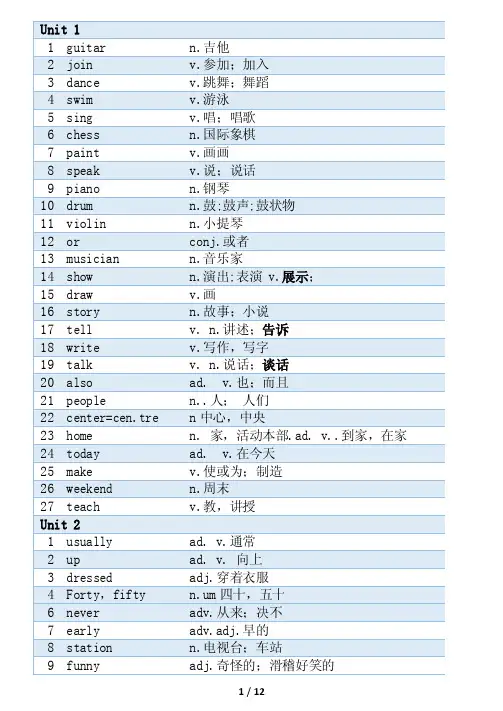
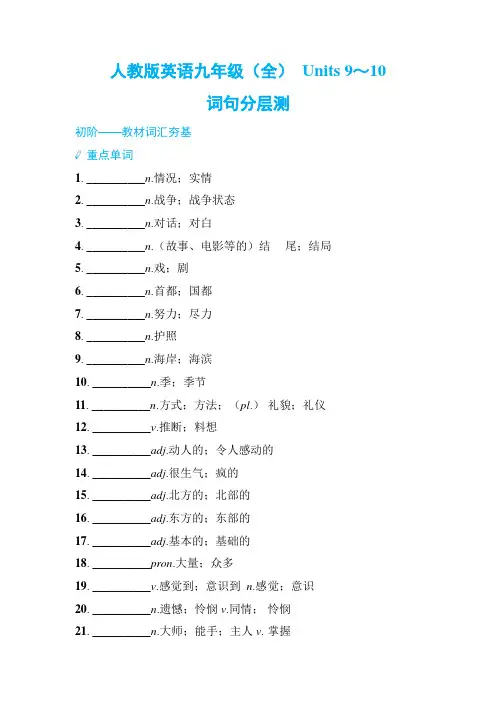
人教版英语九年级(全)Units 9~10词句分层测初阶——教材词汇夯基重点单词1. __________n.情况;实情2. __________n.战争;战争状态3. __________n.对话;对白4. __________n.(故事、电影等的)结尾;结局5. __________n.戏;剧6. __________n.首都;国都7. __________n.努力;尽力8. __________n.护照9. __________n.海岸;海滨10. __________n.季;季节11. __________n.方式;方法;(pl.)礼貌;礼仪12. __________v.推断;料想13. __________adj.动人的;令人感动的14. __________adj.很生气;疯的15. __________adj.北方的;北部的16. __________adj.东方的;东部的17. __________adj.基本的;基础的18. __________pron.大量;众多19. __________v.感觉到;意识到n.感觉;意识20. __________n.遗憾;怜悯v.同情;怜悯21. __________n.大师;能手;主人v. 掌握22. __________v.& n.表扬;赞扬23. __________n.伤;伤口;创伤v.使(身体)受伤;伤害24. __________v.& n.亲吻;接吻25. __________v.敲;击n.敲击声;敲击26. __________adj.空闲的;不用的v. 抽出;留出27. __________adj.空的;空洞的v.倒空;腾空;掏空28. __________adj.悲哀;沮丧adv.(坐、躺、倒)下prep.向下;沿着29. __________prep.除……之外conj.除了;只是词汇拓展1. electricity n.电;电能→__________ (adj.)电子的;电子设备的→__________ (adj.)电的;用电的2. pain n.痛苦;疼痛;苦恼→__________ (adj.)令人痛苦的;令人疼痛的*________________ 不劳无获。
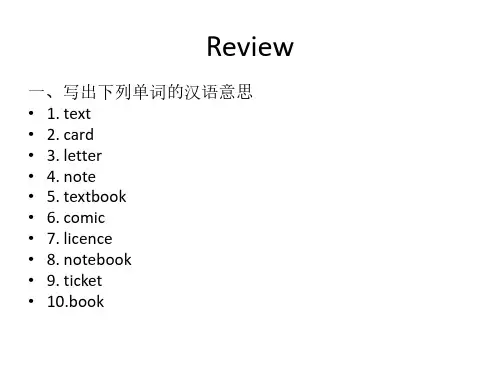
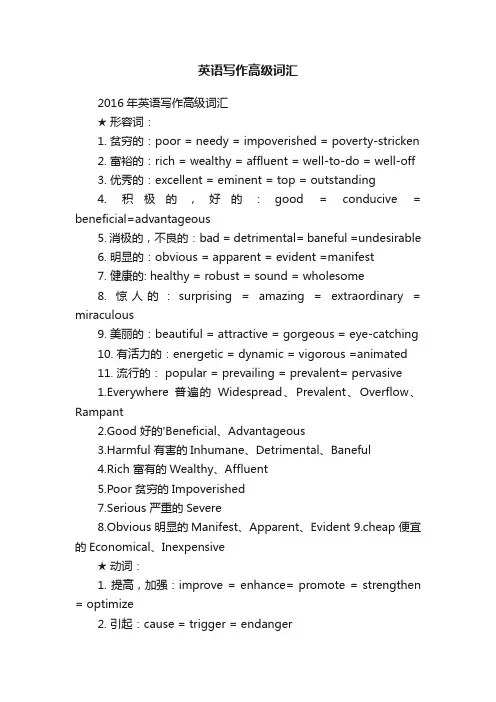
英语写作高级词汇2016年英语写作高级词汇★ 形容词:1. 贫穷的:poor = needy = impoverished = poverty-stricken2. 富裕的:rich = wealthy = affluent = well-to-do = well-off3. 优秀的:excellent = eminent = top = outstanding4. 积极的,好的:good = conducive = beneficial=advantageous5. 消极的,不良的:bad = detrimental= baneful =undesirable6. 明显的:obvious = apparent = evident =manifest7. 健康的: healthy = robust = sound = wholesome8. 惊人的:surprising = amazing = extraordinary = miraculous9. 美丽的:beautiful = attractive = gorgeous = eye-catching10. 有活力的:energetic = dynamic = vigorous =animated11. 流行的: popular = prevailing = prevalent= pervasive1.Everywhere 普遍的Widespread、Prevalent、Overflow、Rampant2.Good 好的'Beneficial、Advantageous3.Harmful 有害的Inhumane、Detrimental、Baneful4.Rich 富有的Wealthy、Affluent5.Poor 贫穷的Impoverished7.Serious 严重的Severe8.Obvious 明显的Manifest、Apparent、Evident 9.cheap 便宜的Economical、Inexpensive★ 动词:1. 提高,加强:improve = enhance= promote = strengthen = optimize2. 引起:cause = trigger = endanger3. 解决:solve =resolve =address = tackle =cope with = deal with4. 拆除:destroy = tear down = knock down = eradicate5. 培养: develop = cultivate = foster = nurture6. 激发,鼓励:encourage = motivate = stimulate = spur7. 认为: think = assert= hold = claim = argue8. 完成:complete = fulfill = accomplish= achieve9. 保留:keep = preserve = retain = hold10. 有害于:destroy = impair = undermine = jeopardize11. 减轻: ease = alleviate = relieve = lighten1.Improve 提高:Promote、Advance、Enhance2.change 改变:Transform3.Emphasize 强调:Highlight、Stress、Address(这是个9星级用法)4.Develop培养:Agriculture、Cultivate、Nurture5.Break 破坏:Impair、Undermine这两个词指的是抽象意义上的破坏Jeopardize、Devastate6.Keep 保存Preserve、Conserve 保护资源7.deal With解决T ackle、Address(这也是高难度用法,很牛)、Resolve 8.need 需要Require、necessitate、call for★ 名词:1. 影响:influence= impact2. 危险:danger = perils =hazard3. 污染:pollution = contamination4. 人类:human beings= mankind = human race5. 老人:old people= the old = the elderly = the aged = senior citizens6. 幸福:happiness = cheerfulness = well-being7. 老师:teachers = instructors = educators = lecturers8. 教育:education = schooling = family parenting =upbringing9. 青少年:young people = youngsters = youths = adolescents10. 优点:advantage = merits = superiority = virtue11. 责任: responsibility = obligation = duty = liability12. 能力: ability = capacity = power = skill13. 职业: job = career = employment = profession14. 娱乐:enjoyment = pastimes = recreation= entertainment15. 孩子: children = offspring = descendant= kid1.Forefather 祖先Ancestor、Predecessor2.Difference不同Gap(简单但是牛)、Distinction3.Crime 犯罪Delinquency、Criminal Act4.Environment 环境Circumstance、Atmosphere、Surrounding、Ambience5.Pollution 污染Contamination6.Human 人类The human race Humanity Humankind7.Danger 危险Peril、Hazard8.In modern society 在当今社会In contemporary society In present-day society In this day and age★ 短语:1. 充满了:be filled with = be awash with = be inundate with = be saturated with2. 努力:struggle for = aspire after = strive for = spare no efforts for3. 从事: embark on = take up = set about = go in for4. 在当代: in contemporarysociety = in present-day society= in this day and age5. 大量的: a host of = a multitude of = a vast number of = a vast amount of★ 插入语1.indeed的确,2.surely无疑,3.however然而,4.obviously 显然,5.frankly坦率地说,6.naturally自然,7.luckily (或happily)for sb.算某人幸运,8.fortunately/luckily幸好,9.honestly 真的,10.briefly简单地说, 11.strange to say说也奇怪,12.needless to say不用说, 13.most impor tant of all最为重要是,13.worse still更糟糕的是, 14.in a few words(或in sum,in short)简而言之, 15.in other words换句话说,16.in a sense在某种意义上,17.in general一般说来,18.in my view在我看来, 19.in conclusion总之, 20.in summary概括地说, 21.in fact事实上, 22.in the first place首先, 23.in addition 此外, 24.of course当然, 25.to my knowledge据我所知, 26.for instance(或example)例如, 27.as a matter of fact事实上,28.strictly speaking严格地说,29.generally speaking一般地说,30.judging from…根据……判断,?31.to be sure无疑,32.to sum up概括地说,33.to tell the truth老实说, 34.I am sure我可以肯定地说,35.I believe我相信, 36.I wonder我不知道, 37.that is也就是说,38.it seems看来是,39.as I see it照我看来,40.what is important (serious)重要(严重)的是【2016年英语写作高级词汇】。
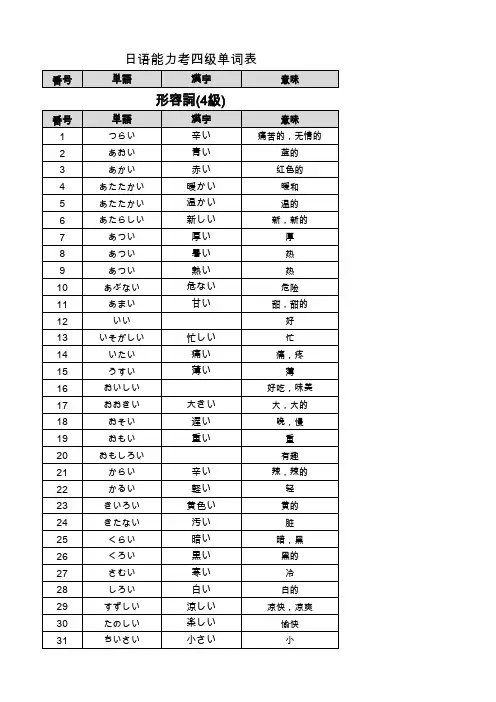
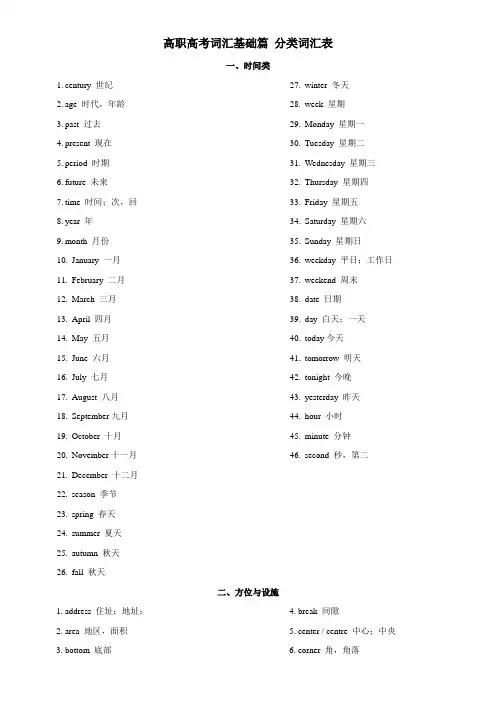
高职高考词汇基础篇分类词汇表一、时间类1.century 世纪2.age 时代,年龄3.past 过去4.present 现在5.period 时期6.future 未来7.time 时间;次,回8.year 年9.month 月份10.January 一月11.February 二月12.March 三月13.April 四月14.May 五月15.June 六月16.July 七月17.August 八月18.September九月19.October 十月20.November十一月21.December 十二月22.season 季节23.spring 春天24.summer 夏天25.autumn 秋天26.fall 秋天27.winter 冬天28.week 星期29.Monday 星期一30.Tuesday 星期二31.Wednesday 星期三32.Thursday 星期四33.Friday 星期五34.Saturday 星期六35.Sunday 星期日36.weekday 平日;工作日37.weekend 周末38.date 日期39.day 白天;一天40.today今天41.tomorrow 明天42.tonight 今晚43.yesterday 昨天44.hour 小时45.minute 分钟46.second 秒,第二二、方位与设施1.address 住址;地址;2.area 地区,面积3.bottom 底部4.break 间隙5.center / centre 中心;中央6.corner 角,角落7.dark暗处8.east 东方9.south 南方10.west 西方11.north 北方12.left 左边13.middle 中间;中级的14.right 右面;对的15.front 前面的;前面16.behind 在后面17.edge 边缘18.end 结束;终止;19.first 开始,开端20.floor楼层;层st 最后22.level 水平线,水平23.line(人或物之)排;列24.outside 在外面25.position 位置,形势26.side 边,旁边27.space空间28.surface 表面29.here 这里,这儿30.there 那里,那儿31.top 顶;上部32.flat 公寓33.room 房间;空间34.building 房屋;建筑物35.bathroom 浴室;洗澡间36.toilet 厕所37.bedroom 卧室38.kitchen 厨房39.balcony 阳台40.ceiling 天花板41.door 门42.gate 大门43.ground地面44.hall 大厅,厅堂45.home 家46.house 房子;住宅47.lift (英)电梯48.passage 过道,走廊;文章49.stair 楼梯50.step 台阶,阶梯51.study 书房52.wall 墙53.well 井;水井54.yard 码;院子;场地三、地理与自然气候1.earth 地球;陆地2.space 太空;空间3.heaven 天空;天堂4.sky 天;天空5.sun 太阳6.moon 月球;月亮7.star 星,恒星8.planet 行星9.world 世界10.bank 河岸;银行11.beach 海滩;湖滩12.coast 海岸13.country 乡下,农村;14.countryside 郊外,乡村15.environment 环境16.farm 农场;农庄17.field 田地;牧场18.forest 森林19.grass 草地20.hill 小山;丘陵21.island 岛;岛屿ke 湖;湖泊nd陆地;地面24.mountain 山25.nature自然,自然界26.ocean海洋27.river 河;江28.sea 海;海洋29.sand 沙子30.stream 溪河31.tree 树32.village 乡村;村庄33.wood (复)树木,森林34.America 美洲,美国 亚洲36.Atlantic 大西洋37.Europe 欧洲38.Pacific 太平洋39.air 空气40.temperature 温度41.degree 度数42.heat 热度43.cloud 云44.cloudy 多云的45.rain 雨;雨水46.rainy 下雨的47.wind 风48.windy 有风的49.fog 雾50.smoke 烟51.snow 雪52.snowy 下雪的53.storm 暴风54.weather 天气四、服装配饰与形状1. clothes 衣服,各种衣物2. coat 外套3. overcoat 大衣4. raincoat 雨衣5. jacket 夹克衫6. sweater 毛衣7. shirt 衬衫8. T-shirt T恤衫9. dress 连衣裙10. skirt 短裙11. trousers 裤子12. jeans 牛仔裤13. shorts短裤14. shoes鞋子(复数)15. socks 短袜(复数)16. hat 帽子(指有边的)17. cap (无檐)帽子;18. glove 手套(复. gloves)19. handbag 手提包20. pocket 口袋21. purse (女式)钱包22. ring 戒指;环形物23. scarf 围巾24. tie 领带25. colour (美color) 颜色26. black 黑色;黑色的27. blue 蓝色;蓝色的28. brown 棕色,褐色;棕色的,褐色的29. green 绿色;绿色的30. orange 橙色;橙色的31. pink 粉红色;粉红色的32. red 红色;红色的33. white 白色;白色的34. yellow 黄色;黄色的35. circle 圆形;圈;36. height 高度37. hole 洞38. model模型;模范39. shape 外形,形状40. size 尺寸,大小41. solid 固体的42. big 大的43. small 小的44. long 长的45. short 短的,矮的46. tall 高的47. fat 胖的48. thin 瘦的49. slim 苗条的50. tight 紧的五、文娱与运动1.act 行为,举动2.advertisement 广告3.art 艺术;美术4.cinema 电影院5.movie 电影6.film 电影,胶卷7.Internet 互联网,因特网8.website 网站,网点9.e-mail 电子邮件10.interview 采访11.news消息;新闻12.notice 通知,布告13.programme (美program) (电脑)程序14.role 角色15.story故事16.tale 故事,传说;童话17.window 窗户18.beat (音乐)节拍position 作曲,作文20.concert 音乐会21.party 晚会22.dance舞蹈,舞会23.drum鼓24.guitar 吉他25.group 乐团26.music 音乐27.piano 钢琴28.song 歌曲29.violin 小提琴30.ball 球31.balloon 气球32.baseball 棒球33.volleyball 排球34.basketball 篮球35.football 足球36.soccer 足球37.tennis 网球38.table tennis 乒乓球39.badminton 羽毛球40.kick 踢41.catch 接住,抓住42.bike / bicycle 自行车43.chess 象棋44.club 俱乐部45.coach 教练46.exercise 练习;锻炼47.jump 跳;跃48.kick 踢49.race (速度)竞赛50.ride 骑脚踏车或乘交通工具旅行51.sport 运动52.swim 游泳53.walk 行走;步行六、家庭成员与称呼1.family 家庭;家人2.grandfather 祖父;外祖父3.grandpa (口)爷爷;外公4.grandmother 祖母;外祖母5.grandma(口)奶奶;外婆6.granny 老奶奶7.grandparent 祖父母;外祖父母8.grandchild 孙子/女,外孙子/孙女9.granddaughter 孙女,外孙女10.grandson 孙子,外孙子11.couple 夫妇12.parents 父母亲13.father 爸爸;父亲14.dad(daddy)爸爸15.mother 母亲;妈妈16.Mom(美Mum) 妈妈17.husband 丈夫18.wife妻子19.child (复数children)孩子20.brother 兄;弟21.sister 姐;妹22.son 儿子23.daughter 女儿24.relation 关系;亲属关系25.aunt 姨母;姨母姑母;伯母;婶母26.cousin 堂(表)兄弟;堂(表)姐妹27.uncle叔;伯;舅;姨夫;姑夫28.adult 成年人n 亚洲人;亚洲的30.baby 婴儿;小孩31.boy 男孩32.girl 女孩33.classmate同班同学34.elder 长者;前辈35.enemy 敌人36.European 欧洲人;欧洲的adj.37.fan 粉丝;风扇38.foreigner 外国人39.gentleman 绅士40.friend 朋友41.god 神;(God)上帝42.guest客人,来宾43.hero 英雄44.human人类45.kid小孩dy女士,夫人47.madam夫人,女士48.man (pl.men) 成年男性;人类49.member 成员,会员50.Miss 小姐,女士51.Mr. ( mister) 先生52.Mrs. (mistress) 夫人,太太(称呼已婚妇女)53.Ms. 女士(婚姻状况不明的女子姓名前)54.neighbor(美neighbor) 邻居55.officer警官;官员56.owner 所有者;业主57.patient 病人,患者58.person 人59.people 人们60.woman(复women)妇女,女人61.prisoner 囚犯62.public 公众63.sir先生64.stranger 陌生人,异乡人65.teenager (13-19岁的)青少年66.tourist 游客67.visitor 访问者;参观者;游客68.volunteer 志愿者,自愿兵69.winner获胜者七、旅行与场所1.airline 航空公司2.camp 营地3.country 国家4.map 地图5.package包裹6.picnic 野餐7.sail 航行8.passport 护照9.sight 视力,景物10.tent 帐篷11.tour 旅行;游览12.travel 旅行;游历13.trip 旅行14.visit 参观;拜访;访问15.capital省会,首都16.church 教堂17.city城市;都市;市ernment政府19.state(构成联邦共和国的)州;邦20.hometown家乡,故乡21.town镇;城镇;市镇22.college专科学校;学院23.university大学pany公司25.factory工厂26.fair集市;庙会;展览会27.flat楼中一套房间;公寓(常用复数)28.gym=(gymnasium)体育馆29.supermarket超市30.market市场,集市31.shop商店32.store商店33.restaurant餐馆;饭店34.hospital 医院35.hotel旅馆36.library图书馆37.museum博物馆38.palace皇宫,宫殿39.park公园;停车40.place地方,处所41.pond池塘42.pool水塘43.set设备,设置44.square广场45.stand看台,台;坛;摊46.theatre (美theater)戏院,剧院47.tower塔48.farm农场;农庄49.garden花园,菜园50.zoo动物园八、科技与教育1.clone克隆2.development 发展3.download下载(计算机用语)cation教育5.experiment实验6.invention发明物7.influence影响rmation信息,消息9.machine机器10.message消息;信息11.robot机器人12.technology科学技术13.accent口音14.answer回答;答复15.conversation对话16.dialogue对话17.difficulty困难,难处18.discussion讨论19.exam = examination考试20.example例子21.fact事实, 事件22.form表,表格;23.grade分数;成绩;24.grammar语法25.handwriting字迹26.homework家庭作业27.knowledge知识,学问nguage语言29.letter字母;书信30.meaning意思;含义;意图31.method方法,办法32.mistake错误33.note笔记;便条34.point要点35.practice实践;练习36.progress进步;进展37.word单词;话语38.question问题39.reply回复;答复40.research研究;探讨41.review温习;复习42.rule规则43.score得分44.search搜寻;搜查45.sentence句子46.speech演讲47.summary摘要,概要48.term学期49.test测验50.title标题,题目51.topic题目,话题52.underline下划线53.unit单元九、学校与课程1.school学校2.playground运动场;操场3.classroom教室4.office办公室;办公楼b =laboratory实验室6.bell铃;钟7.blackboard黑板8.chalk粉笔9.class班级10.desk书桌,写字台11.group小组12.lesson课,教训13.row一排;一行14.seat座位15.activity活动16.course课程17.subject学科18.Chinese 语文19.English 英语20.math(s)=mathematics数学21.physics物理22.chemistry化学23.geography地理24.history历史25.art艺术;美术26.music音乐,乐曲27.P.E.(=physical education)体育28.science科学29.article文章30.book书31.card卡片,名片32.daily日报33.magazine杂志;期刊34.mail邮件35.newspaper报纸36.page页;页码37.paragraph (文章的)段落38.picture图片39.poem诗歌40.report报告;报道41.text文本,课文十、物品与文具1.basket篮子2.bed床3.box盒子,箱子4.bottle瓶子5.brush刷子6.chair椅子7.can (美)罐头,罐子8.candle蜡烛9.clock钟10.cover盖子,罩11.desk书桌;办公桌12.drawer抽屉13.furniture家具14.handbag手提包15.iron熨斗16.key钥匙,键mp灯18.lock锁19.mirror镜子20.photo=photograph照片21.picture图片;照片22.rope粗绳;绳索23.rubbish垃圾24.safe保险箱25.shelf架子(复shelves)26.soap肥皂27.sofa 沙发28.stick木棍29.table桌子30.thing东西31.thread线32.toothbrush牙刷33.toothpaste牙膏34.towel浴巾,毛巾35.umbrella雨伞;伞36.watch手表37.bag书包;口袋38.card纸牌39.crayon蜡笔40.dictionary字典,词典41.doll玩具娃娃42.eraser橡皮43.gift礼物;赠品44.gun枪45.ink墨水46.kite风筝47.notebook笔记本48.paper纸49.pencil铅笔50.postcard明信片51.ruler尺子52.schoolbag书包53.stamp邮票54.tape录音带55.toy玩具56.tool工具十一、人体与健康1.arm胳膊2.back后背3.blood血液4.body身体;躯体5.brain大脑6.chest胸膛7.ear耳朵8.eye眼睛9.face脸10.fat脂肪11.finger手指12.foot (复feet)脚;足13.hair头发;毛发14.hand手15.head头部16.heart心脏17.knee膝盖18.leg腿;腿部19.neck脖子20.mouth嘴21.nose鼻子22.shoulder肩膀23.stomach胃,腹部24.tail尾巴25.tongue舌头26.tooth牙齿(复数teeth)27.accident事故,意外的事28.ache 疼痛29.headache头痛30.toothache牙疼31.disease疾病32.illness疾病;生病33.problem问题,难题34.trouble问题,麻烦35.cancer癌症36.fever发烧;发热37.cold感冒38.cough咳嗽39.blind失明40.burn烧伤41.cut剪;切;割42.flu流感43.wound伤害44.health健康;卫生45.treatment治疗,待遇46.operation手术/操作,运转47.medicine药48.drug药物49.breath呼吸50.sleep睡眠51.voice声音52.X-ray X光,X射线53.death死,死亡十二、食物类1.fruit 水果2.apple苹果3.banana香蕉4.orange橙子5.pear梨6.watermelon西瓜7.strawberry草莓8.grape葡萄9.vegetable蔬菜10.cabbage卷心菜11.potato土豆12.tomato西红柿13.meat(食用的)肉14.beef牛肉15.chicken鸡肉mb羊肉17.pork 猪肉18.beef 牛肉19.steak 牛排20.food食物,食品21.biscuit饼干22.bread面包23.butter黄油24.cake蛋糕25.candy糖果26.cheese奶酪27.chocolate巧克力28.dumpling饺子29.egg鸡蛋30.ham火腿31.hamburger汉堡32.noodle面条(常用pl.)33.oil油34.pancake薄煎饼35.pie 馅饼36.rice稻米,米饭37.salad沙拉38.salt盐39.sandwich三明治40.sausage香肠41.sugar糖42.sweet甜食;糖果;43.boil 煮44.fry油炸45.taste尝;品尝;品味十三、物质与电器1.board甲板;木板2.chalk粉笔3.coal煤4.electricity电5.fire火6.glass玻璃7.gold金子,黄金8.ice冰9.iron钢铁10.metal金属11.matter物质12.object物,物体13.oil油类;油14.rock岩石15.paint油漆;颜料16.rubber橡皮;橡胶17.sand沙;沙子18.silk(蚕)丝;绸;丝织品19.silver银20.steel钢21.stone石头22.camera照相机23.CD光盘24.VCD影碟光盘25.DVD数码影碟=television电视;电视机puter电脑;电子计算机28.fan电扇29.fridge电冰箱30.keyboard键盘mp灯,油灯32.light灯,灯光33.machine机器34.phone=telephone电话35.radio无线电,收音机36.record唱片37.recorder录音机38.screen屏幕;银幕39.tape磁带;录音带40.video录象;录像带十四、社会与情感1.attention注意,关心2.care照料,在乎3.cheer欢呼;喝彩4.cheat哄骗,作弊5.cry喊叫6.doubt怀疑7.emotion感情,情感8.excuse原谅;宽恕9.favorite最受喜爱的(东西)10.fear恐惧,害怕11.feeling感觉12.fun快乐;有趣13.greeting问候14.hate讨厌15.hobby爱好,兴趣16.interest兴趣17.joy欢乐,乐趣ugh大笑;嘲笑19.love爱;热爱20.pardon原谅,宽恕21.peace和平;安宁22.pity怜悯;同情23.pleasure愉快;快乐24.praise赞扬,表扬25.pride自豪,骄傲26.regard问候,尊敬27.respect尊敬,尊重28.regret 遗憾;后悔29.shame羞愧,惭愧30.silence寂静;沉默31.sense感觉32.smell气味33.smile微笑34.surprise使吃惊;令人意想不到的事情35.thank感谢;谢意36.touch触摸37.wish愿望;祝愿38.wonder奇迹39.worry担忧40.victory胜利41.ability能力42.action行动,活动43.army军队44.background背景45.birth出生, 诞生46.cause原因,事业w法律48.marriage婚姻49.chance机会50.change改变51.culture文化52.goal 目标53.habit习惯54.housework家务bour(labor)劳动56.life(lives) 终身;生活57.order顺序58.population人口59.relation关系60.right权利61.safety安全62.skill技能;技巧63.society社会64.spirit 精神65.standard标准,水准66.truth事实;真相67.value价值68.waste浪费,垃圾69.war战争70.work工作。
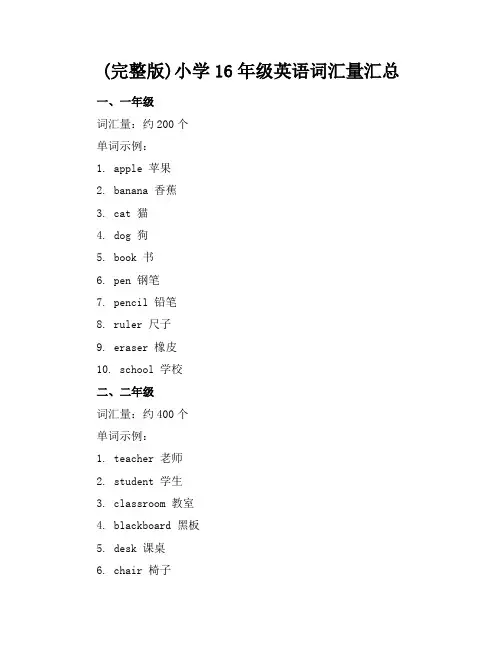
(完整版)小学16年级英语词汇量汇总一、一年级词汇量:约200个单词示例:1. apple 苹果2. banana 香蕉3. cat 猫4. dog 狗5. book 书6. pen 钢笔7. pencil 铅笔8. ruler 尺子9. eraser 橡皮10. school 学校二、二年级词汇量:约400个单词示例:1. teacher 老师2. student 学生3. classroom 教室4. blackboard 黑板5. desk 课桌6. chair 椅子7. window 窗户8. door 门9. floor 地板10. ceiling 天花板三、三年级词汇量:约600个单词示例:1. family 家庭2. mother 母亲3. father 父亲4. brother 兄弟5. sister 姐妹6. grandparents 祖父母7. uncle 叔叔8. aunt 婶婶9. cousin 表兄弟姐妹10. friend 朋友四、四年级词汇量:约800个单词示例:1. city 城市2. country 乡村3. street 街道4. road 路径5. bridge 桥梁6. river 河流7. mountain 山脉8. forest 森林9. beach 海滩10. desert 沙漠五、五年级词汇量:约1000个单词示例:1. season 季节2. spring 春天3. summer 夏天4. autumn 秋天5. winter 冬天6. climate 气候7. weather 天气8. temperature 温度9. wind 风10. snow 雪六、六年级词汇量:约1200个单词示例:1. food 食物2. fruit 水果3. vegetable 蔬菜4. meat 肉类5. drink 饮料6. bread 面包7. rice 米饭8. pasta 意面9. salad 沙拉10. dessert 甜点(完整版)小学16年级英语词汇量汇总一、一年级词汇量:约200个单词示例:1. apple 苹果2. banana 香蕉3. cat 猫4. dog 狗5. book 书6. pen 钢笔7. pencil 铅笔8. ruler 尺子9. eraser 橡皮10. school 学校二、二年级词汇量:约400个单词示例:1. teacher 老师2. student 学生3. classroom 教室4. blackboard 黑板5. desk 课桌6. chair 椅子7. window 窗户8. door 门9. floor 地板10. ceiling 天花板三、三年级词汇量:约600个单词示例:1. family 家庭2. mother 母亲3. father 父亲4. brother 兄弟5. sister 姐妹6. grandparents 祖父母7. uncle 叔叔8. aunt 婶婶9. cousin 表兄弟姐妹10. friend 朋友四、四年级词汇量:约800个单词示例:1. city 城市2. country 乡村3. street 街道4. road 路径5. bridge 桥梁6. river 河流7. mountain 山脉8. forest 森林9. beach 海滩10. desert 沙漠五、五年级词汇量:约1000个单词示例:1. season 季节2. spring 春天3. summer 夏天4. autumn 秋天5. winter 冬天6. climate 气候7. weather 天气8. temperature 温度9. wind 风10. snow 雪六、六年级词汇量:约1200个单词示例:1. food 食物2. fruit 水果3. vegetable 蔬菜4. meat 肉类5. drink 饮料6. bread 面包7. rice 米饭8. pasta 意面9. salad 沙拉10. dessert 甜点一、一年级词汇量:约200个单词示例:1. apple 苹果2. banana 香蕉3. cat 猫4. dog 狗5. book 书6. pen 钢笔7. pencil 铅笔8. ruler 尺子9. eraser 橡皮10. school 学校二、二年级词汇量:约400个单词示例:1. teacher 老师2. student 学生3. classroom 教室4. blackboard 黑板5. desk 课桌6. chair 椅子7. window 窗户8. door 门9. floor 地板10. ceiling 天花板三、三年级词汇量:约600个单词示例:1. family 家庭2. mother 母亲3. father 父亲4. brother 兄弟6. grandparents 祖父母7. uncle 叔叔8. aunt 婶婶9. cousin 表兄弟姐妹10. friend 朋友四、四年级词汇量:约800个单词示例:1. city 城市2. country 乡村3. street 街道4. road 路径5. bridge 桥梁6. river 河流7. mountain 山脉8. forest 森林9. beach 海滩10. desert 沙漠五、五年级词汇量:约1000个单词示例:1. season 季节2. spring 春天4. autumn 秋天5. winter 冬天6. climate 气候7. weather 天气8. temperature 温度9. wind 风10. snow 雪六、六年级词汇量:约1200个单词示例:1. food 食物2. fruit 水果3. vegetable 蔬菜4. meat 肉类5. drink 饮料6. bread 面包7. rice 米饭8. pasta 意面9. salad 沙拉10. dessert 甜点。
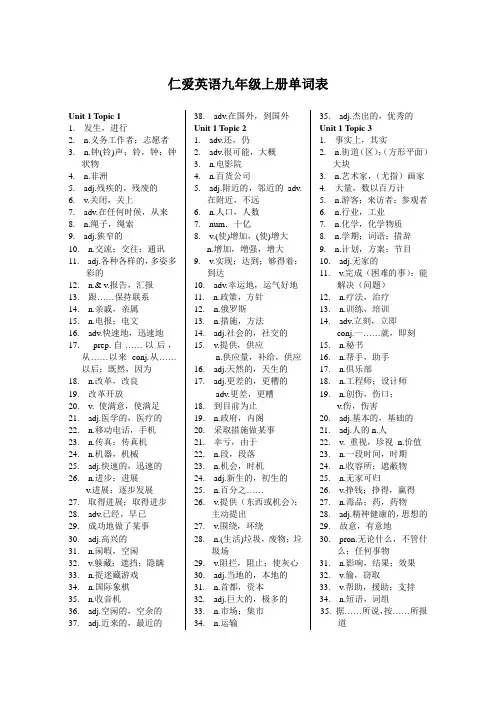
仁爱英语九年级上册单词表Unit 1 Topic 11. 发生,进行2. n.义务工作者;志愿者3. n.钟(铃)声;铃,钟;钟状物4. n.非洲5. adj.残疾的,残废的6. v.关闭,关上7. adv.在任何时候,从来8. n.绳子,绳索9. adj.狭窄的10. n.交流;交往;通讯11. adj.各种各样的,多姿多彩的12. n.& v.报告,汇报13. 跟……保持联系14. n.亲戚,亲属15. n.电报;电文16. adv.快速地,迅速地17. prep.自……以后,从……以来conj.从……以后;既然,因为18. n.改革,改良19. 改革开放20. v. 使满意,使满足21. adj.医学的,医疗的22. n.移动电话,手机23. n.传真;传真机24. n.机器,机械25. adj.快速的,迅速的26. n.进步;进展v.进展;逐步发展27. 取得进展;取得进步28. adv.已经,早已29. 成功地做了某事30. adj.高兴的31. n.闲暇,空闲32. v.躲藏;遮挡;隐瞒33. n.捉迷藏游戏34. n.国际象棋35. n.收音机36. adj.空闲的,空余的37. adj.近来的,最近的38. adv.在国外,到国外Unit 1 Topic 21. adv.还,仍2. adv.很可能,大概3. n.电影院4. n.百货公司5. adj.附近的,邻近的adv.在附近,不远6. n.人口,人数7. num.十亿8. v.(使)增加,(使)增大n.增加,增强,增大9. v.实现;达到;够得着;到达10. adv.幸运地,运气好地11. n.政策,方针12. n.俄罗斯13. n.措施,方法14. adj.社会的,社交的15. v.提供,供应n.供应量,补给,供应16. adj.天然的,天生的17. adj.更差的,更糟的adv.更差,更糟18. 到目前为止19. n.政府,内阁20. 采取措施做某事21. 幸亏,由于22. n.段,段落23. n.机会,时机24. adj.新生的,初生的25. n.百分之……26. v.提供(东西或机会);主动提出27. v.围绕,环绕28. n.(生活)垃圾,废物;垃圾场29. v.阻拦,阻止;使灰心30. adj.当地的,本地的31. n.首都,资本32. adj.巨大的,极多的33. n.市场;集市34. n.运输35. adj.杰出的,优秀的Unit 1 Topic 31. 事实上,其实2. n.街道(区);(方形平面)大块3. n.艺术家,(尤指)画家4. 大量,数以百万计5. n.游客;来访者;参观者6. n.行业,工业7. n.化学,化学物质8. n.学期;词语;措辞9. n.计划,方案;节目10. adj.无家的11. v.完成(困难的事);能解决(问题)12. n.疗法,治疗13. n.训练,培训14. adv.立刻,立即conj.一……就,即刻15. n.秘书16. n.帮手,助手17. n.俱乐部18. n.工程师;设计师19. n.创伤,伤口;v.伤,伤害20. adj.基本的,基础的21. adj.人的n.人22. v. 重视,珍视n.价值23. n.一段时间,时期24. n.收容所;遮蔽物25. n.无家可归26. v.挣钱;挣得,赢得27. n.毒品;药,药物28. adj.精神健康的,思想的29. 故意,有意地30. pron.无论什么,不管什么;任何事物31. n.影响,结果;效果32. v.偷,窃取33. v.帮助,援助;支持34. n.短语,词组35. 据……所说,按……所报道36. n. 上下文;语境;背景37. n.体力劳动者,劳工,工人38. adj.残酷的,冷酷的39. n.专题研究,项目,方案40. n. & v.援助,帮助41. adj.小学教育的;主要的;最初的42. n.贡献;捐款43. 为……做贡献44. v.鼓励45. adj.道德(上)的46. n.发展,开发47. v.尊敬,尊重48. n.重要性,重要49. v. 持续,继续做50. n. (美国)大学;(英国)学院Review of Unit 11.adv.真正地;实际上2.n.方法,办法3.n.(13~19岁之间的)青少年4.adv.几乎不5.pron.大量,充足,众多n.充足,大量6.大量的7.n.阳光,日光8.v.沐日光浴;晒太阳9.n.海滩,海滨10.n.排球11.adj.文化的12.v.(互联网上)冲浪,浏览Unit2 Topic11.n.蜜蜂2.n.蝴蝶,蝶泳3.n.肮脏,杂乱;困境4.n.羞耻,羞愧5.det.& pron.几个,数个6.v.倒出;倾泄;不断流出7.adj.废弃的,丢弃的,无用的;v.浪费8.n.村民,乡下人9.v.摧毁,破灭10.砍到11.v.污染12.n.天啊,啊呀13.v.呼吸14.n.疼,痛,痛苦15.v.生产;制造16.n.胸部,胸膛17.adj.很坏的,极讨厌的18.v.承受,忍受19.n.主编,编辑20.n.一次吸入的空气21.n.土壤,土地22.adj.有害的23.(尤指对健康或环境)有害的,导致损害的24.adj.聋的25.v.印刷26.n.听力,听觉27.n.丧失;损失;丢失28.adv.不久前,最近29.v.打扰;扰乱30.伤害,损害31.adj.使人不舒服的,令人不舒适的32.adj.令人不快的;不舒服的33.n.种类,类别;品种v.整理,把……分类34.adj.环境的35.prep.包括……在内36.prep.向,朝37.n.句子;判决,宣判38.n.煤;煤块39.v.造成;创造40.n.血41.高血压42.n.行星Unit2 Topic 21.n.沙2.n.沙暴3.转换成,变成4.n.沙漠v.舍弃,遗弃5.n.人6.conj.虽然,尽管;即使7.v.减少,减轻8.adv.彻底地;完整地9.n.使用者,用户10.pron.没有一个,毫无11.n.垃圾,废弃物12.在各处,到处13.v.吐,唾14.adj.野的,野生的15.pron.没有人n.小人物,无足轻重的人16.adj.不整洁的,凌乱的17.adj.最差的,最糟的18.adj.无理的,粗鲁的19.n.行为,举止20.n.状况;形势;局面21.v.处罚,惩罚22.adv.可能,大概23.pron.人人,每个人24.adv.无处,哪里都不25.拿走26.n.氧气27.n.洞,坑28.臭氧层29.n.放射,放射物30.adv.直接地31.二氧化碳32.v.(使)出现;(使)形成n.种类;形式33.n.毛毯,毯子34.v.渗出;逃跑;逃脱35.v.上升,起床;升起36.温室效应37.提到,涉及,有关38.n.不足;缺少;短缺39.v.防止,避免40.n.资源,财力41.v.发现,找到42.v.再次使用;重复使用43.adj.缺水的,(口)渴的44.adv.几乎,将近45.n.法律,法令;定律Unit2 Topic 31.n.保护,防卫2.n.组织,团体;机构3.v.回收利用;再利用4.adj.塑料的5.n.(美)罐子;罐头6.v.点头7.n.同意,一致;协议8.n.分歧,争论9.赶快,快点10.放弃11.n.电池12.modal v.应该13.停止,关掉14.n.电;电能15.n.距离16.n.织物,布料17.n.行动;行为18.毕竟,归根结底19.酸雨20.adj.原子核的,原子能的;核动力的21.n.沼气22.n.技术23.n.(收割后干燥的)禾杆,麦秆,稻草24.adj.可更新的,可再生的25.n.不利因素;障碍;不便之处26.n.步骤,过程v.加工,处理27.v.需要,要求28.adj.电动的,用电的29.adj.最知名的30.磁悬浮列车31.n.德国人;德语32.prep.每,每一33.n.轮,车轮,轮子34.adj.效率高的;有能力的35.n.向导,导游;指南,手册36.n.道路,途径37.n.钢,钢铁38.n.挥手;招手;海浪v.招手;摆手39.adj.深的,厚的adv.深深地,在深处40.n.来源,出处;起源,源头41.用完,耗尽42.adv.全世界,世界各地43.n.阳光,日光44.n.水蒸气,蒸汽;水汽45.v.去除,使消失;移开46.v.代替,取代47.adj.干燥的,雨少的,干性的v.使……干,弄干,擦干48.n.昆虫49.v.咬,叮50.n.种植园主Review of Units 1-21. n.同事,同僚2. n.摩托车3. n.汽油4. pron.任何人,无论谁5. v.检查,调查6. v.嫁;娶;结婚7. n.重量,分量8. n.传播媒介,传播工具9. n. 一包,一袋,一盒v.将……包装好10. n.产品,制品11. adj.过度的,过分的12. n.商品,货品13. adv.严重地;严肃地14. n.录像带,录像15. v.允许,准许16. n.质量;品质;人品17. adj.(有关)历史的18. n.生活方式;工作方式19. n.差别,差异unit 3 Topic 11.n.漫画2.n.(书、剧本、电影等中的)人物,角色;(汉)字,字体;品格3.adv.普通地,广泛地4.prep.遍及;贯穿5.从今往后,从现在开始6.n.外国人7.电影制作人8.n.停车房;车库9.对……感到高兴;满意于……10.v.把……打包;n.包,捆;(猎犬、野兽等的)一群11.出差12.adv.在今晚13.n.西班牙语;adj.西班牙人的,西班牙的,西班牙语的14.与……相似,与……相像15.v.交流,沟通16.n.对话,谈话17.n.口译译员18.v.解释,说明19.adj.不可能存在的;不可能的20.adj.双胞胎之一的n.双胞胎之一21.v.分,划分22.把……分成……23.v.掘(地),凿(洞),挖(土)24.v.放置,安放,搁25.母语26.n.起源,根源;根,词根27.n.商人,买卖人28.adj.出生地的,当地的29.n.讲(某种语言)的人;发言者30.adj.外国的31.n.根据,根基,总部v.以……为基础(或根据)32.adj.欧洲的33.n.王国;管辖范围;领域34.n.旅游业;观光35.n.(正式的)会议;商谈36.n.旅游者;游客37.n.英国,不列颠38.adj.强大的;有权势的;有影响力的39.adj.最重要的,最成功的40.n.方位;位置Unit 3 Topic 21.为……送行;送别2.n.陌生人3.n.拇指4.搭乘,搭车5.n.小型公共汽车,中巴6.让某人搭便车7.上车8.n.航班飞机;空中航行9.n.旅游指南(或手册)10.conj.无论何时,在任何……的时候11.v.上(船、火车、飞机等);住宿12.v.点头,鞠躬13.n.沉默,无声v.使安静,压制14.n.臀部,髋15.v.& n.表扬,赞扬16.n.研究,调查,探索17.做调查18.n.秘密19.adj.迷惑的,困惑的20.n.胜利21.n.误解,误会22.adj.典型的,有代表性的23.adv.不同地,有差异地24.adj.负面的,消极的25.v.认为,以为,考虑到26.adj.诚实的,老实的;坦率的27.adj.正面的;乐观的28.有时,间或29.adj.古代的,古老的30.adj.奇妙的,有魔力的31.n.生物,动物32.n.皇帝33.v.比较,对比34.把……比作……35.n.勇气,胆略36.v.在(词语等下)画线;画底线标出37.n.错误,失误v.误会,误解38.犯错误39.n.雄孔雀40.n.骄傲,自豪41.n.智慧,精明42.adj.英国的;英国人的43.v.叩头;磕头;惟命是从44.n.表达;词语;表情45.n.拼写,拼法46.n.电梯,升降机47.n.发音48.n.分49.n.烹饪书;烹饪菜谱50.adv.完全,全部地,整个地Unit 3 Topic 31.n.口音,腔调2.adj.口头的3.modal v.敢,敢于4.adj.想睡的,困倦的,瞌睡的5.adj.最终的,最后的6.adj.真实的,实际存在的;真正的7.v.复述,重新讲述8.adj.间接的,附带的9.n.(外)孙女10.v.发音,读(音)11.n.对话,独白12.n.作文,作曲;构成13.v.抄写,复印14.n.笔记本15.n.记事簿,日记,日记簿16.写日记17.n.磁带,录音带18.adv.大声地19.n.物品,东西;目的,目标20.n.教科书,课本21.n.能力,才能22.吸一口气23.n.牙膏24.v.预习;预告25.v.复习;回顾;n.复习;复查;评论26.v.翻译27.n.讨论,谈论,商讨28.adv.精确地,确切地29.n.尊敬,荣幸v.给予表扬(或者奖励、头衔、称号);尊敬,尊重30.只要31.坚持(做)某事32.n.重复唱的歌词;圣歌33.v.达到,获得;成功34.adv.容易地,轻易地35.v.下载36.adv.的确,事实上37.adj.有效的,产生预期效果的38.v.模仿,仿效Review of Unit 31.n.公司2.adj.厌倦的,烦闷的3.v.集中(注意力),聚精会神4.v.拉;拽;扯;拖5.v.折叠;包6.v提到,说到Unit 4 Topic 11.n.火箭2.n.金属3.n.卫星4.n.宇宙飞船5.n.锁v.(用锁)锁上,被锁住6.n.手提电脑7.adj.数码的,数字的8.n.电灯泡9.n.飞机10.adj.耐磨的11.n.朝鲜;韩国12.n.发明,创造13.v.列清单,把……列表n.名单,目录,清单14.n.彩色铅笔(粉笔、蜡笔等)15.n.想法,看法,主意16.adj.愚蠢的,傻的17.v.集思广益,动脑筋18.v.估值,评价,评估19.adj.详细的20.v.重新设计21.n.想像力;想像22.n.气球,热气球23.n.枪,炮24.n.机器人25.n.键盘26.n.探险者,勘探者27.n.标示,记号,符号v.做记号,做标记28.n.体系,方法,制度29.adj.人造的,非天然的Unit 4 Topic 21.v.显示;显露;展示2.n.屏幕;银幕3.n.外星人adj.外国的,陌生的,外星的4.外层空间5.v.描述;形容;把……称为6.n.宇航员7.v.钦佩,羡慕8.v.掌握,精通n.主人9.n.跳舞者,舞蹈演员10.v.意识到,领会;实现11.n.宇宙12.太阳系13.adj.古罗马的,古罗马帝国的14.n.上帝;神15.n.直径16.n.风暴,暴(风)雨17.n.重力;引力18.v.重,有……重19.adv.一般地,通常20.n.(尤指长途)旅行21.v.限制,限定n.限度,限制22.n.激动;令人激动的事23.v.发射,发起,发行24.prep.超出;除……之外Unit 4 Topic 31.v.证明,证实2.月球探测器3.n.传说,传奇故事4.n.重要性,意义5.adv.独立地,自主地6.n.里程碑,陆标7.n.太空漫步8.adj.电子的9.n.航天服10.n.望远镜11.n.娱乐;招待12.n.& v.怀疑,疑惑13.无疑地14.adj.极小的,微小的15.prep.在……内;在……里adv.在里面16.adv.通常,正常情况下17.n.脑;智力;脑力18.v.取消,撤销;废止19.n.工作场所20.v.连接;把……联系起来21.例如22.adv.而且,再说prep.除……之外(还)23.adv.正确地,恰当地24.n.仆人,佣人25.adj.确定的,无疑的;一定会……26.肯定,确定,无疑27.独自,单独28.警告,告诫29.modal v.可以,可能30.n.家务劳动,家务事Review of Units 3-41.n.女服务员2.n.杂志3.n.公鸡4.n.妻子,太太5.n.小鸡6.n.油漆,油漆涂层v.在……刷油漆;用颜料画7.v.奋斗;努力;争取8.n.王宫,宫殿9.颐和园10.n.塔11.n.监狱12.n.囚犯,俘虏13.n.词汇,词汇量14.一束;一串。
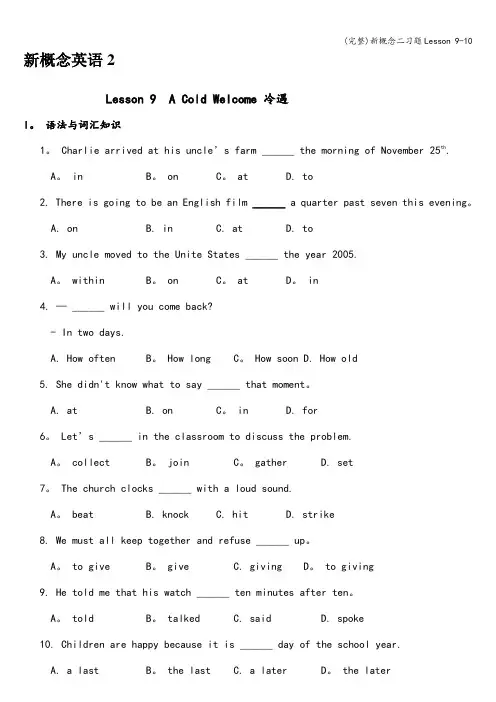
新概念英语2Lesson 9 A Cold Welcome 冷遇I。
语法与词汇知识1。
Charlie arrived at his uncle’s farm ______ the morning of November 25th.A。
in B。
on C。
at D. to2. There is going to be an English film ______ a quarter past seven this evening。
A. onB. inC. atD. to3. My uncle moved to the Unite States ______ the year 2005.A。
within B。
on C。
at D。
in4. — ______ will you come back?- In two days.A. How often B。
How long C。
How soon D. How old5. She didn't know what to say ______ that moment。
A. atB. on C。
in D. for6。
Let’s ______ in the classroom to discuss the problem.A。
collect B。
join C。
gather D. set7。
The church clocks ______ with a loud sound.A。
beat B. knock C. hit D. strike8. We must all keep together and refuse ______ up。
A。
to give B。
give C. giving D。
to giving9. He told me that his watch ______ ten minutes after ten。
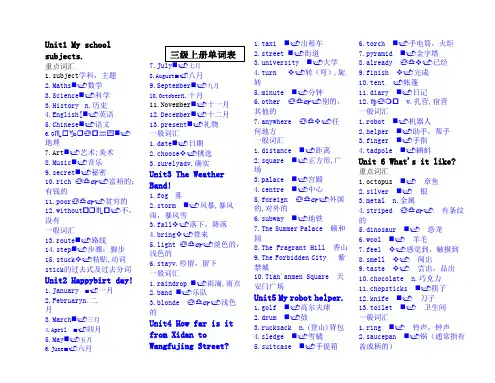
Unit1 My school subjects.重点词汇1.subject学科,主题2.Maths⏹数学3.Science⏹科学3.History n.历史4.English[⏹英语5.Chinese⏹语文6.G♏☐♑❑♋☐♒⍓⏹地理7.Art⏹艺术;美术8.Music⏹音乐9.secret⏹秘密10.rich ♋♎富裕的;有钱的11.poor♋♎贫穷的12.without☐❑♏☐不,没有一般词汇13.route⏹路线14.step⏹步骤;脚步15.stuck 粘贴,动词stick的过去式及过去分词Unit2 Happybirt day!1.January ⏹一月2.Februaryn.二月3.March⏹三月4.April ⏹四月5.May⏹五月6.June⏹六月七月8.August⏹八月9.September⏹九月10.October n.十月11.November⏹十一月12.December⏹十二月13.present⏹礼物一般词汇1.date⏹日期2.choose 挑选3.surelyadv.确实Unit3 The WeatherBand!1.fog 雾2.storm ⏹风暴,暴风雨,暴风雪3.fall 落下,降落4.bring 带来5.light ♋♎淡色的,浅色的6.stayv.停留,留下一般词汇1.raindrop ⏹雨滴,雨点2.band ⏹乐队3.blonde ♋♎浅色的Unit4 How far is itfrom Xidan toWangfujing Street?1.taxi ⏹出租车2.street ⏹街道3.university ⏹大学4.turn 转(弯),旋转5.minute ⏹分钟6.other ♋♎别的,其他的7.anywhere ♋♎任何地方一般词汇1.distance ⏹距离2.square ⏹正方形,广场3.palace ⏹宫殿4.centre ⏹中心5.foreign ♋♎外国的,对外的6.subway ⏹地铁7.The Summer Palace 颐和园8.The Fragrant Hill 香山9.The Forbidden City 紫禁城10.Tian'anmen Square 天安门广场Unit5 My robot helper.1.golf ⏹高尔夫球2.drum ⏹鼓3.rucksack n.(登山)背包4.sledge ⏹雪橇5.suitcase ⏹手提箱6.torch ⏹手电筒,火炬7.pyramid ⏹金字塔8.already ♋♎已经9.finish 完成10.tent 帐篷11.diary ⏹日记12.♍♋❍☐ v.扎营,宿营一般词汇1.robot ⏹机器人2.helper ⏹助手,帮手3.finger ⏹手指4.tadpole ⏹蝌蚪Unit 6 What's it like?重点词汇1.octopus ⏹ 章鱼2.silver ⏹ 银3.metal n.金属4.striped ♋♎ 有条纹的5.dinosaur ⏹ 恐龙6.wool ⏹ 羊毛7.feel 感觉到,触摸到8.smell 闻出9.taste 尝出,品出10.chocolate n.巧克力11.chopsticks ⏹筷子12.knife ⏹ 刀子13.toilet ⏹ 卫生间一般词汇1.ring ⏹ 铃声,钟声2.saucepan ⏹锅(通常指有盖或柄的)3.member ⏹成员,会员4.roast ♋♎烘烤的,烤制的5.rubber ⏹橡胶,橡皮6.good ness ⏹善良,好意Unit7.This is the house where we live. 重点词汇1.cave ⏹ 洞穴2.castle n.城堡3.hut ⏹简陋的小房子,棚,舍4.apartment ⏹ 一套房间一般词汇1.balcony ⏹阳台2.upstairs ♋♎ 楼上的3.downstairs ♋♎楼上的4.town house 市内住宅5.floating house 水上飘移的房子6.travelling house 旅行房7.mobile house 移动房Unit 8 Time went by quickly!重点词汇1.time ⏹时间e v.用,使用,运用3.air ⏹空气4.fire ⏹火焰,火5.future ⏹ 将来,未来6.quarter ⏹四分之一一般词汇1.robot ⏹机器人2.flyer ⏹飞行员3.London Bridge 伦敦桥4.The Great Wall of China中国长城5.World Wide Web 互联网6.Global village 地球村7.space walk 太空行走8.sandglass 沙漏(计时用)9.candle clock 蜡烛钟10.weight-driven clock机械表11.spring-driven clock发条表12.pendulum ♍●☐♍钟摆表Unit9 Shall we gocamping next year?重点词汇1.museum ⏹ 博物馆2.bookshop ⏹书店3.swan ⏹天鹅4.anything ☐❑☐⏹任何事物5.camel ⏹科学6.waterfall ⏹ 瀑布7.science ⏹科学8.enjoy 喜欢,享受一般词汇1.hope 希望2.countryside ⏹乡下,农村3.idea ⏹主意4.mean v.表示是......意思5.Australia ⏹澳大利亚Unit10 Have you everbeen to a sciencemuseum?重点词汇1.airport n.飞机场2.chemist ⏹化学家3.club ⏹ 俱乐部4.station ⏹ 车站,所5.polioce ⏹ 警察6.restaurant ⏹餐馆,饭店7.tape ⏹ 录音带8.recorder ⏹录音机9.jam ⏹果酱10.businessman ⏹ 商人11.college ⏹ 大学,学院一般词汇1.fire ⏹火焰,火2.police station 警察局3.London ⏹伦敦4.fridge ⏹电冰箱5.fire station 消防站6.freezer ⏹制冰器,冰箱7.crowd ⏹人群,许多8.indeed ♋♎确实,真正地Unit11 What's it made of?重点词汇1.plastic ⏹塑料制品2.wood ⏹木制品3.metal n.金属4.glass n.玻璃5.wool ⏹羊毛6.silver ⏹ 银7.other ♋♎ 别的8.plate ⏹盘子,碟子9.shelf ⏹架子10.fork ⏹叉子11.scissors ⏹剪刀12.spoon ⏹匙13.glove ⏹ 手套14.empty ♋♎空的15.happen 碰巧,发生16.expensive ♋♎ 昂贵的17.noisy ♋♎吵闹的,喧闹的18.hard ♋♎ 坚硬的19.heavy ♋♎ 重的20.chea ♋♎便宜的一般词汇1.material ⏹原料,材料2.special ♋♎特别的3.cupboard ⏹碗橱4.cooker ⏹炊具,锅5.shell ⏹壳6.seashore ⏹ 海岸7.recycle ☎使)再循环eless ♋♎ 无用的9.reuse ⏹再使用,重新使用10.weak ♋♎弱的Unit12 Going for gold. 重点词汇1.gold ⏹ 黄金2.high ♋♎高的3.tennis ⏹ 网球4.environment ⏹环境5.interest ⏹兴趣,趣味一般词汇1.athlete ⏹运动员2.medal ⏹奖章,奖牌3.high jump 跳高4.long jump 跳远5.dive 跳水6.water polo ⏹水球7.boxing ⏹拳击8.rowing ⏹赛艇9.skating ⏹溜冰10.sailing ⏹帆船11.volleyball ⏹ 排球12.shooting ⏹射击13.cycling ⏹自行车14.hockey ⏹曲棍球15.handball ⏹ 手球16.wrestling ⏹摔跤17.protect 保护,防护18.volunteer ⏹志愿者19.historical ♋♎有关历史的Unit13 Christmas fun.重点词汇1.Christmas ⏹ 圣诞节2.space ⏹间隔,空间3.miss v.错过4.businesswoman ⏹ 女商人5.forget 忘记6.present ⏹ 礼物7.address ⏹地址一般词汇1.fun ⏹ 娱乐,有趣的人或事2.turn ⏹ 轮流,顺序3.washroom ⏹厕所4.treasure ⏹ 财宝,珠宝5.Santa ⏹圣诞老人等同于Santa Claus6.stair ⏹ 楼梯7.wardrobe ⏹木柜,衣柜8.jingle 使发叮当声9.code ⏹代号,暗号10.stocking ⏹(女式)长袜11.wreath ⏹花环,花冠12.reindeer ⏹驯鹿13.carol ⏹ 欢乐之歌,颂歌Unbit 14 We love toplay games.重点词汇1.soon ♋♎ 不久,一会儿2.leave 离开,遗忘3.café⏹ 咖啡馆4.everything ☐❑☐⏹每件事,一切5.excellent ♋♎优秀的一般词汇ugh 笑2.score ⏹ 得分,比分3.around ♋♎ 在周围,在附近4.Emma ⏹埃玛(女子名)5.David ⏹戴维(男子名)6.Harry n.哈利(男子名)7.Fred n.弗雷德(男子名)8.William ⏹ 威廉(男子名)9.Daisy ⏹戴茜(女子名)10.Katy ⏹ 凯蒂(女子名)11.stone ⏹ 石块12.soup ⏹ 汤13.whole adj.整个的14.pot ⏹ 罐,锅15.stranger ⏹ 陌生人16.village ⏹ 乡下人Unit15 How to askquestions.重点词汇1.what ☐❑☐⏹ 什么2.where ♋♎在哪里,在何处3.which ♋♎☐❑☐⏹哪一个,哪些4.who ☐❑☐⏹ 谁,哪个人5.newspaper ⏹报纸6.suddenly ♋♎ 突然地一般词汇1.question ⏹问题2.Jane ⏹ 简(女子名)3.Jill ⏹ 吉尔(女子名)4.Paul ⏹ 保罗(男子名)5.Sue ⏹ 苏(女子名)6.Betty ⏹ 贝蒂(女子名)7.Mary ⏹ 玛丽(女子名)8.Jim ⏹吉姆(男子名)9.coin ⏹硬币10.flute ⏹ 笛Unit 16 When I grow up重点词汇1.nurse ⏹护士2.actor ⏹男演员3 actress ⏹女演员4.journalist ⏹新闻记者5.firemann ⏹消防队员(男)6.secretary ⏹秘书7.pilot n.飞行驾驶员,飞行员8.cook n.厨师9.photographer ⏹摄影师10 ♏⏹♑♓⏹♏♏❑ ⏹工程师11.painter ⏹油漆工,画家12 ♐☐☐♦♌♋●●♏❑ ⏹ 足球运动员一般词汇1 ♋♦♦❑☐⏹♋◆ ⏹ 宇宙航行员。
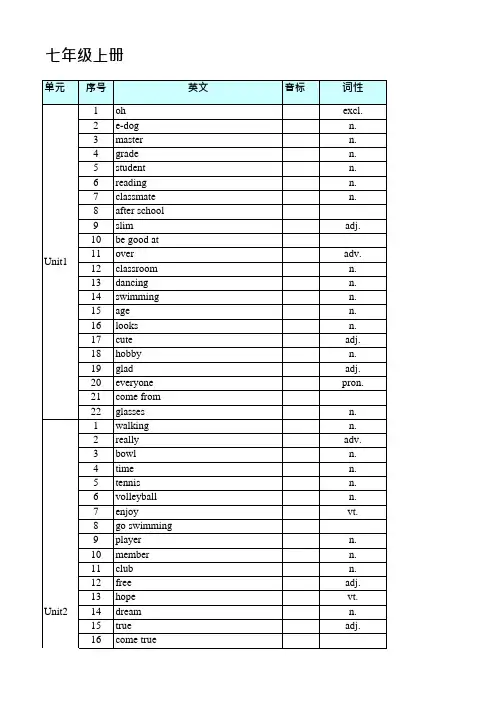
人教版▏九年级英语(下册)Unit 10 词汇、句型精讲词汇精讲1. bow(1) bow作名词,意为“弓,弓形物”。
例如:He raised his bow slowly and let the arrow fly.他慢慢地举起弓,让箭飞出去。
The boy made a deep bow to the teacher and ran away.那个孩子向老师深深地鞠了一个躬然后跑掉了。
(2) bow作动词,意为“鞠躬,低下头”。
例如:He bowed his head in shame. 他惭愧地低下头来。
She bowed her thanks. 她鞠躬致谢。
Age had bowed his once straight back.他年事已高,过去挺直的腰板弯了。
2. relaxrelax是动词,可以作不及物动词或及物动词,作及物动词时,宾语是人,表示“使某人放松;使某人休息;使某人轻松”。
例如:Now I want to rest and relax. (作不及物动词)现在我得休息一下,放松放松。
I need a cup of tea to relax myself. (作及物动词)我需要喝杯茶使自己轻松一下。
【拓展】relaxed;relaxing(1) relaxed是形容词,意为“某人感到轻松、放松、不受拘束的”。
指某人“感到”轻松。
通常用来形容人。
有类似用法的词有interested\excited\surprised\bored\tired。
例如:He is feeling relaxed.= He is relaxed. 他感到很轻松。
The song can make me relaxed. 这首歌让我感到轻松。
(2) relaxing是形容词,意为“某事情令人轻松的”,指某事或者某物“令人”轻松。
通常用来修饰物或事。
有类似用法的词有interesting\exciting\surprising\boring\tiring。
NO WORD PINYIN1LEVEL JIBIE 1阿ā乙2 3阿姨āyí乙2 4啊ā甲1 5啊ɑ甲1 6挨āi乙2 7哎āi乙2 8哎呀āiyā乙2 9哎哟āiyō丙3 10唉āi乙2 11哀悼āidào丁4 12哀求āiqiú丁4 13挨ái丙3 14癌ái丙3 15矮ǎi甲1 16艾滋病àizībìng丁4 17爱ài甲1 18爱戴àidài丁4 19爱好àihào乙2 20爱护àihù乙2 21爱国àiguó丙3 21爱面子ài miànzi丁4 22爱情àiqíng乙2 23爱人àiren乙2 24爱惜àixī丁4 25爱心àixīn丙3 25碍事ài shì丁4 26安ān丙3 26百姓bǎixìng丙3 27安定āndìng丙3 27摆弄bǎinòng丙3 28安静ānjìng甲1 29安宁ānníng丁4 30安排ānpái甲1 31安全ānquán乙2 32安慰ānwèi乙2 33安稳ānwěn丁4 34安详ānxiáng丁4 35安心ān xīn乙2 36安置ānzhì丁4 37安装ānzhuāng丙3 38按àn乙2 39按劳分配àn láo fēnpèi丁4 40按期ànqī丙3 41按时ànshí乙2 42按照ànzhào乙2 43暗àn乙244暗暗àn'àn丙3 45暗淡àndàn丁4 46暗杀ànshā丁4 47暗示ànshì丁4 48暗中ànzhōng丁4 49岸àn乙2 50案àn丁4 51案件ànjiàn丁4 52案情ànqíng丁4 53昂贵ángguì丁4 55凹āo丁4 56熬áo丙3 57傲慢àomàn丁4 58奥秘àomì丙3 59芭蕾舞bālěiwǔ丁4 60扒bā丁4 61八bā甲1 62捌bā丁4 63疤bā丁4 64巴结bājie丁4 65拔bá乙2 66把bǎ丙3 67把bǎ甲1 68把bǎ甲1 69把柄bǎbǐng丁4 70把关guān丁4 71把手bǎshou丁4 72把握bǎwò丙3 73把戏bǎxì丁4 74坝bà丙3 75霸道bàdào丁4 76霸权bàquán丁4 77霸占bàzhàn丁4 78罢bà丙3 79罢工bà gōng丙3 80爸爸bàbɑ甲1 81吧(罢)bɑ甲1 82掰(擘)bāi丁4 83白bái甲1 84白bái乙2 85白白báibái丙3 86白菜báicài乙2 87白酒báijiǔ丁4 88白天báitiān乙2 89百bǎi甲1 90百倍bǎibèi丁4 91百分比bǎifēnbǐ丁492百分点bǎifēndiǎn丙3 92百花齐放bǎi huā qí fàng丁4 93百货bǎihuò丙3 94百家争鸣bǎijiā zhēngmíng丁4 95柏树bǎishù丙3 96摆bǎi甲1 97摆动bǎidòng丁4 98摆脱bǎituō丙3 99败bài乙2 100败坏bàihuài丁4 101拜bài丁4 102拜访bàifǎng丙3 103拜会bàihuì丙3 104拜年bài nián丁4 105斑bān丁4 105拜师bàishī丁4 106班bān甲1 107班机bānjī丁4 108班长bānzhǎng乙2 109班子bānzi丁4 110搬bān甲1 111搬运bānyùn丁4 112扳bān丁4 113般bān丙3 114颁布bānbù丁4 115颁发bānfā丁4 116板bǎn乙2 117版bǎn丁4 118扮bàn丁4 119扮演bànyǎn丁4 120拌bàn丁4 121伴bàn丁4 122伴侣bànlǚ丁4 123伴随bànsuí丁4 124伴奏bànzòu丁4 125瓣bàn丙3 126半bàn甲1 127半边天bànbiāntiān丁4 128半岛bàndǎo丙3 129半导体bàndǎotǐ乙2 130半截bànjié丁4 131半径bànjìng丁4 133半路bànlù丁4 134半数bànshù丁4 135半天bàntiān甲1 136半途而废bàntú ér fèi丁4 137半夜bànyè乙2138半真半假bàn zhēn bàn jiǎ丁4 139办bàn甲1 140办法bànfǎ甲1 141办公bàn gōng乙2 142办公室bàngōngshì甲1 143办理bànlǐ丙3 144办事bàn shì乙2 145办学bàn xué丁4 146帮bāng乙2 147帮bāng丙3 148帮忙bāng máng乙2 149帮助bāngzhù甲1 150榜样bǎngyàng乙2 150榜bǎng丁4 151绑bǎng丙3 151膀子bǎngzi丁4 152绑架bǎngjià丁4 153棒bàng丙3 154棒bàng丙3 155棒球bàngqiú丁4 156磅bàng丙3 157傍晚bàngwǎn乙2 158包bāo乙2 159包bāo乙2 160包办bāobàn丁4 161包袱bāofu丙3 162包干儿(乾)bāogānr丁4 163包裹bāoguǒ乙2 164包含bāohán丙3 165包括bāokuò乙2 166包围bāowéi丙3 167包装bāozhuāng丁4 168包子bāozi乙2 169剥bāo丙3 170雹子báozi丁4 171薄báo乙2 172保bǎo乙2 173保持bǎochí乙2 174保存bǎocún乙2 175保管bǎoguǎn丙3 176保护bǎohù乙2 177保健bǎojiàn丁4 178保留bǎoliú乙2 179保密bǎo mì丙3 180保姆bǎomǔ丁4 181保守bǎoshǒu丙3 182保卫bǎowèi乙2183保温bǎowēn丁4 184保险bǎoxiǎn丙3 185保养bǎoyǎng丁4 186保障bǎozhàng丙3 187保证bǎozhèng乙2 188保重bǎozhòng丁4 189堡垒bǎolèi丁4 190饱bǎo甲1 191饱和bǎohé丁4 192饱满bǎomǎn丁4 193宝bǎo丙3 194宝贝bǎobèi丁4 195宝贵bǎoguì乙2 196宝剑bǎojiàn丁4 197宝库bǎokù丁4 198宝石bǎoshí丙3 199抱bào甲1 200抱负bàofù丁4 201抱歉bàoqiàn乙2 202抱怨bàoyuàn丁4 203报bào甲1 204报bào丙3 205报仇bào chou丙3 206报酬bàochou丙3 207报答bàodá丁4 208报到bào dào乙2 209报道(报导)bàodào乙2 210报复bàofù丙3 211报告bàogào乙2 212报刊bàokān丙3 212报价bàojià丁4 213报考bàokǎo丁4 214报名bào míng乙2 214报警bàojǐng丙3 215报社bàoshè丙3 216报销bàoxiāo丁4 217报纸bàozhǐ乙2 219暴风雨bào fēng yǔ丁4 220暴力bàolì丁4 220暴发bàofā丁4 221暴露bàolù丙3 222暴雨bàoyǔ丙3 223爆bào丁4 224爆发bàfā丙3 225爆破bàopò丁4 226爆炸bàozhà丙3 227爆竹bàozhú丁4228杯bēi甲1 229杯子bēizi甲1 230碑bēi乙2 231悲哀bēi'āi丙3 232悲惨bēicǎn丁4 233悲愤bēifèn丁4 234悲观bēiguān丙3 235悲剧bēijù丁4 236悲伤bēishāng丁4 237悲痛bēitòng乙2 238背bēi乙2 239背包bēibāo丙3 240卑鄙bēibì丁4 241北běi甲1 242北边běibiān甲1 243北部běibù乙2 244北方běifāng乙2 245北面běimiàn乙2 246辈bèi丙3 247背bèi乙2 248背后(後)bèihòu乙2 249背景bèijǐng丙3 250背面bèimiàn丁4 251背叛bèipàn丁4 252背诵bèisòng丙3 253背心bèixīn丙3 254贝壳bèiké丁4 255倍bèi甲1 256倍数bèishù丁4 257备用bèiyòng丁4 258被bèi甲1 259被动bèidòng丙3 260被告bèigào丁4 261被迫bèi pò丙3 262被子bèizi乙2 262被窝bèiwō丁4 263奔bēn丙3 263备bèi丙3 264奔驰bēnchí丁4 264奔波bēnbō丁4 265奔跑bēnpǎo丙3 266奔腾bēnténg丁4 267本běn乙2 268本běn甲1 269本běn乙2 270本来běnlái乙2 271本领běnlǐng乙2272本能běnnéng丁4 273本钱běnqián丁4 274本人běnrén丙3 275本身běnshēn丙3 275本色běnsè丁4 276本事běnshi乙2 277本性běnxìng丁4 278本着běnzhe丁4 279本质běnzhì乙2 280本子běnzi甲1 281奔bèn丙3 282笨bèn乙2 283笨蛋bèndàn丁4 284笨重bènzhòng丁4 285笨拙bènzhuō丁4 286崩溃bēngkuì丁4 287绷bēng丁4 288绷带bēngdài丁4 289甭béng丙3 290蹦bèng丁4 291逼bī乙2 292逼近bījìn丁4 293逼迫bīpò丁4 294鼻涕bítì丁4 295鼻子bízi乙2 296比bǐ甲1 297比方bǐfɑng丙3 298比分bǐfēn丁4 299比价bǐjià丁4 300比较bǐjiào甲1 301比例bǐlì乙2 302比如bǐrú乙2 303比赛bǐsài甲1 304比喻bǐyù丁4 305比重bǐzhòng丁4 306笔bǐ甲1 307笔迹bǐjì丁4 308笔记bǐjì乙2 309笔试bǐshì丙3 309笔者bǐzhě丁4 310笔直bǐzhí丁4 311彼bǐ丁4 312彼此bǐcǐ丙3 313碧绿bìlǜ丁4 314毕竟bìjìng丙3 315毕业bì yè乙2 316币bì丁4317闭bì乙2 318闭幕bì mù丙3 319闭幕式bìmùshì丁4 320闭塞bìsè丁4 321弊病bìbìng丁4 322弊端bìduān丁4 323必bì丙3 324必定bìdìng丙3 325必将bìjiāng丁4 326必然bìrán乙2 327必修bìxiū丙3 328必需bìxū丙3 329必须bìxū甲1 330必要bìyào乙2 331壁bì丙3 332臂bì丁4 333避bì乙2 334避免bìmiǎn乙2 335鞭策biāncè丁4 336鞭炮biānpào丁4 337鞭子biānzi丁4 338边biān甲1 339边…边…biān…biān乙2 340边防biānfáng丁4 341边疆biānjiāng丙3 342边界biānjiè丙3 343边境biānjìng丁4 344边缘biānyuán丙3 345编biān乙2 346编号biānhào丁4 347编辑biānjí丙3 348编者按biānzhě'àn丁4 348编辑部biānjíbù丁4 349编制biānzhì丙3 350贬低biǎndī丁4 350编撰biānzhuàn丁4 351贬义biǎnyì丁4 352贬值biǎnzhí丁4 353扁biǎn乙2 354便biàn乙2 355便道biàndào丁4 356便利biànlì丙3 357便条biàntiáo乙2 358便于biànyú丙3 359变biàn甲1 360变成biàn chéng甲1 361变动biàndòng丙3362变革biàngé丙3 363变更biàngēng丁4 364变化biànhuà甲1 365变换biànhuàn丁4 366变迁biànqiān丁4 366变幻biānhuàn丁4 367变形biàn xíng丁4 368变质biàn zhì丁4 369辨别biànbié丁4 370辨认biànrèn丁4 371辩护biànhù丁4 372辩解biànjiě丁4 373辩论biànlùn丙3 374辩证biànzhèng丁4 375辩证法biànzhèngfǎ丁4 376辫子biànzi丁4 377遍biàn甲1 378遍biàn乙2 379遍地biàndì丁4 380标biāo丁4 381标本biāoběn丁4 382标点biāodiǎn乙2 383标题biāotí丁4 384标语biāoyǔ丙3 385标志biāozhì丙3 386标准biāozhǔn乙2 387表biǎo甲1 388表达biǎodá乙2 389表面biǎomiàn乙2 390表明biǎomíng乙2 391表情biǎoqíng丙3 392表示biǎoshì甲1 393表现biǎoxiàn甲1 394表演biǎoyǎn甲1 395表扬biǎoyáng甲1 396表彰biǎozhāng丁4 397憋biē丁4 398别bié甲1 399别bié丙3 400别处biéchù丙3 401别的bié de甲1 402别人biérén甲1 403别字biézì丙3 403别说biéshuō丙3 404濒临bīnlín丙3 404别扭bièniu丁4 405宾馆bīnguǎn乙2406兵bīng乙2 407冰bīng乙2 408冰棍儿bīnggùnr丙3 409冰淇凌bīngqílíng丁4 410柄bǐng丙3 411丙bǐng丙3 412饼bǐng丙3 413饼干(乾)bǐnggān乙2 414秉性bǐngxìng丁4 415病bìng甲1 416病虫害bìngchónghài丁4 417病床bìngchuáng丙3 418病毒bìngdú丁4 419病房bìngfáng乙2 420病号bìnghào丁4 421病菌bìngjūn乙2 422病情bìngqíng丙3 423病人bìngrén乙2 424并bìng乙2 425并bìng乙2 426并存bìngcún丁4 427并非bìng fēi丁4 428并列bìngliè丁4 429并排bìngpái丁4 430并且bìngqiě乙2 431玻璃bōli乙2 433播bō丙3 434播放bōfàng丁4 435播送bōsòng丙3 436播音bō yīn丁4 437播种bōzhòng丁4 438拨bō丙3 439拨款bō kuǎn丁4 440波动bōdòng丁4 440波bō丁4 441波浪bōlàng丙3 442波涛bōtāo丁4 443菠菜bōcài丙3 444博览会bólǎnhuì丁4 445博士bóshì丙3 446博物馆bówùguǎn丙3 447薄膜bómó丁4 448薄弱bóruò丙3 449搏斗bódòu丁4 450伯父(伯伯)bófù(bóbo)乙2 451伯母bómǔ乙2 452脖子bózi乙2453驳斥bóchì丁4 454捕bǔ乙2 455捕捞bǔlāo丁4 456捕捉bǔzhuō丁4 457补bǔ乙2 458补偿bǔcháng丁4 459补充bǔchōng乙2 460补救bǔjiù丁4 461补课bù kè乙2 462补贴bǔtiē丁4 463补习bǔxí乙2 464补助bǔzhù丁4 465卜bǔ丁4 466不bù甲1 467不安丙3 468不卑不亢bù bēi bù kàng丁4 469不比bùbǐ丙3 470不必bùbì乙2 471不曾bùcéng丙3 472不辞而别bùcí er bié丁4 473不错bùcuò甲1 474不大bùdà乙2 475不但bùdàn甲1 476不当bùdàng丁4 477…不得bude丁4 478不得不bùdébù乙2 479不得了bù déliǎo乙2 480不得已bùdéyǐ丁4 481不等bùděng丁4 482不定bùdìng丁4 483不断bùduàn乙2 484不对bù duì丙3 485不法bùfǎ丁4 486不妨bùfáng丁4 487不敢当bù gǎndāng乙2 488不公bùgōng丁4 489不够bùgòu丙3 490不顾bùgù丙3 491不管bùguǎn乙2 492不过bùguò乙2 493不好意思bù hǎoyìsi乙2 494不见bùjiàn丙3 495不见得bù jiàndé丙3 496不解bù jiě丁4 497不禁bùjīn丙3 498不仅bùjǐn乙2 499不久bùjiǔ甲1500不觉bù jué丙3 501不堪bùkān丁4 502不可bùkě丙3 503不愧bùkuì丁4 504不利bùlì丙3 505不良bùliáng丁4 506不料bùliào丙3 507不论bùlùn乙2 508不满bùmǎn丙3 509不免bùmiǎn丙3 510不平bùpíng乙2 511不然bùrán乙2 512不容bùróng丁4 513不如bùrú甲1 514不少bùshǎo乙2 515不时bùshí丁4 516不是bùshi丙3 517不是…而是…bù shì…ér shì…丙3 518不是…就是…bù shì…jiù shì…丙3 519不是吗bù shì mɑ乙2 520不停bù tíng丙3 521不同bù tóng甲1 522不惜bùxī丁4 523不相上下bù xiāng shàng xià丁4 525不行bùxíng乙2 526不幸bùxìng乙2 527不朽bùxiǔ丁4 528不许bù xǔ乙2 529不言而喻bù yán ér yù丁4 530不要bùyào甲1 531不要紧bù yàojǐn乙2 532不一定bù yīdìng乙2 533不宜bùyí丁4 534不用bùyòng甲1 535不由得bùyóude丙3 537不怎么样(麽)bù zěnmeyàng丙3 538不正之风bù zhèng zhī fēng丁4 539不知不觉bù zhī bù jué丁4 540不止bùzhǐ丙3 541不只bùzhǐ丙3 542不至于bùzhìyú丁4 543不住bù zhù乙2 544不足bùzú丙3 545布bù甲1 546布告bùgào丙3 547布局bùjú丁4 548布置bùzhì乙2549步bù乙2 550步兵bùbīng丁4 551步伐bùfá丁4 552步行bùxíng丁4 553步骤bùzhòu丙3 554步子bùzi丁4 555埠bù丁4 556部bù乙2 557部队bùduì乙2 558部分bùfen甲1 559部件bùjiàn丁4 560部门bùmén乙2 561部署bùshǔ丙3 562部位bùwèi丁4 563部长bùzhǎng乙2 564擦cā甲1 565猜cāi乙2 566猜测cāicè丁4 567猜想cāixiǎng丙3 568裁cái丁4 569裁缝cáifeng丙3 570裁决cáijué丁4 571裁军cáijūn丁4 572裁判cáipàn丙3 573材料cáiliào乙2 574才cái丙3 575才cái甲1 576才干(乾)cáigàn丁4 577才能cáinéng丙3 577才华cáihuá丁4 578才智cáizhì丁4 579财cái丁4 580财产cáichǎn丙3 581财富cáifù丙3 582财经cáijīng丁4 583财会cáikuài丁4 584财力cáilì丁4 585财务cáiwù丁4 586财政cáizhèng丙3 587踩cǎi乙2 588采cǎi乙2 589采访cǎifǎng丁4 590采购cǎigòu乙2 591采集cǎijí丁4 592采纳cǎinà丁4 593采取cǎiqǔ乙2 594采用cǎiyòng乙2595彩色cǎisè乙2 596菜cài甲1 597菜单càidān丁4 598餐cān丁4 599餐车cānchē丙3 600餐厅cāntīng乙2 601参观cānguān甲1 602参加cānjiā甲1 603参军cān jūn丁4 604参考cānkǎo丙3 605参谋cānmóu丙3 606参议院cānyìyuàn丁4 607参与cānyù丁4 608参阅cānyuè丁4 609参照cānzhào丁4 610蚕cán丙4 611残cán丁4 612残暴cánbào丁4 613残疾cánjí乙2 614残酷cánkù丙3 615残忍cánrěn丁4 616残余cányú丁4 617惭愧cánkuì丙3 618惨cǎn丙3 619灿烂cànlàn丙3 620苍白cāngbái丙3 621苍蝇cāngying丙3 622舱cāng丙3 623仓促cāngcù丁4 624仓库cāngkù丙3 625藏cáng乙2 626操cāo丁4 627操场cāochǎng甲1 628操劳cāoláo丁4 629操练cāoliàn丁4 630操心cāoxīn丙3 631操纵cāozòng丙3 632操作cāozuò丙3 633槽cáo丁4 634草cǎo甲1 635草案cǎo'àn丙3 636草地cǎodì乙2 637草莓cǎoméi丙3 637草率cǎoshuài丁4 637草坪cǎopíng丁4 638草原cǎoyuán乙2 639厕所cèsuǒ乙2640策划cèhuà丁4 641策略cèluè丁4 642侧cè丙3 643侧面cèmiàn丁4 644册cè乙2 644侧重cèzhòng丁4 645测cè丙3 646测定cèdìng丁4 647测量cèliáng丙3 648测试cèshì丙3 649测算cèsuàn丁4 650测验cèyàn乙2 651层céng甲1 652层出不穷céng chū bù qióng丁4 653层次céngcì丁4 654曾céng乙2 654层面céngmiàn丁4 655曾经céngjīng乙2 656蹭cèng丁4 657插chā乙2 658插秧chā yāng丙3 659插嘴chāzuǐ丁4 660叉chā丁4 661叉子chāzǐ乙2 662差别chābié丙3 663差错chācuò丁4 664差距chājù丁4 665差异chāyì丁4 666茶chá甲1 667茶馆cháguǎn丙3 668茶话会cháhuàhuì丙3 669茶叶cháyè丙3 670查chá甲1 671查处cháchǔ丁4 672查获cháhuò丁4 673查明chá míng丁4 674查阅cháyuè丁4 675差chà乙2 676差chà甲1 677差不多chà bu duō乙2 678差点儿chà diǎnr乙2 679刹那chànà丁4 680诧异chàyì丁4 681岔chà丁4 682拆chāi乙2 683柴油cháiyóu丁4 684掺chān丁4685搀chān丁4 686蝉chán丁4 687馋chán丁4 688谗言chányán丁4 689缠chán丁4 690铲chǎn丙3 691产chǎn丁4 692产地chǎndì丁4 693产量chǎnliàng乙2 694产品chǎnpǐn乙2 695产区chǎnqū丁4 696产生chǎnshēng乙2 697产物chǎnwù丙3 698产业chǎnyè丁4 699产值chǎnzhí丙3 700阐明chǎnmíng丁4 701阐述chǎnshù丁4 702颤chàn丁4 703颤动chàndòng丙3 704颤抖chàndǒu丙3 705昌盛chāngshèng丁4 706猖狂chāngkuáng丁4 707尝cháng乙2 708尝试chángshì丁4 709常cháng甲1 710常常chángcháng甲1 711常规chángguī丁4 712常见cháng jiàn丁4 713常年chángnián丁4 714常识chángshí丙3 715常务chángwù丁4 716常用chángyòng丁4 717长cháng甲1 718长处chángchù丁4 719长度chángdù丙3 720长短chángduǎn丁4 721长久chángjiǔ丙3 722长期chángqī乙2 722长年chángnián丁4 723长寿chángshòu丁4 724长途chángtú乙2 725长远chángyuǎn丙3 726长征chángzhēng丁4 727偿cháng丁4 728偿还chánghuán丁4 729肠cháng丙3 730厂房chǎngfáng丁4731厂家chǎngjiā丁4 732厂商chǎngshāng丁4 733厂长chǎngzhǎng丙3 734场chǎng甲1 735场chǎng甲1 736场合chǎnghé丙3 737场面chǎngmiàn丙3 738场所chǎngsuǒ丁4 739敞开chǎngkāi丁4 740畅谈chàngtán丁4 741畅通chàngtōng丁4 742畅销chàngxiāo丁4 743唱chàng甲1 744倡议chàngyì丁4 745超chāo乙2 746超产chāochǎn丁4 747超出chāochū丁4 748超额chāo'é丙3 749超过chāoguò乙2 750超级chāojí丁4 751超越chāoyuè丁4 752抄chāo乙2 753抄写chāoxiě乙2 754钞票chāopiào丙3 755朝cháo甲1 756朝代cháodài丁4 757嘲笑cháoxiào丁4 758潮cháo丙3 759潮流cháoliú丁4 760潮湿cháoshī丙3 761吵chǎo乙2 762吵架chǎo jià丙3 763吵闹chǎonào丁4 764吵嘴chǎo zuǐ丁4 765炒chǎo丙3 766车chē甲1 767车床chēchuáng丁4 768车间chējiān乙2 769车辆chēliàng丙3 770车厢chēxiāng丙3 771车站chēzhàn甲1 772扯chě丙3 773撤chè丙3 774撤退chètuì丁4 775撤销chèxiāo丁4 776彻底chèdǐ乙2 777尘土chéntǔ丙3778沉chén丙3 779沉淀chéndiàn丁4 780沉静chénjìng丁4 781沉闷chénmèn丁4 782沉默chénmò乙2 783沉思chénsī丙3 784沉痛chéntòng丁4 785沉重chénzhòng丙3 786沉着chénzhuó丁4 787陈旧chénjiù丁4 788陈列chénliè丙3 789陈述chénshù丁4 790趁chèn乙2 791衬衫chènshān乙2 792衬衣chènyī乙2 793称心chèn xīn丁4 794撑chēng丙3 795称chēng乙2 796称号chēnghào丁4 797称呼chēnghu丙3 798称赞chēngzàn乙2 799城chéng甲1 800城市chéngshì甲1 801城镇chéngzhèn丁4 802成chéng甲1 803成chéng丙3 804成本chéngběn丙3 805成分(成份)chéngfèn乙2 806成功chénggōng乙2 807成果chéngguǒ乙2 808成绩chéngjì甲1 809成交chéng jiāo丁4 810成就chéngjiù乙2 811成立chénglì乙2 812成品chéngpǐn丁4813成千上万chéng qiān shàngwàn丙3814成人chéngrén丁4 815成熟chéngshú乙2 816成套chéng tào丁4 817成天chéngtiān丙3 818成为chéngwéi乙2 819成效chéngxiào丁4 820成心chéngxīn丁4 821成语chéngyǔ丙3 822成员chéngyuán丙3 823成长chéngzhǎng乙2824呈chéng丁4 825呈现chéngxiàn丁4 826乘chéng乙2 827乘机chéngjī丁4 828乘客chéngkè丙3 829乘务员chéngwùyuán丁4 830盛chéng丙3 831程度chéngdù乙2 832程序chéngxù丙3 833惩chéng丁4 834惩办chéngbàn丁4 835惩罚chéngfá丁4 836澄清chéngqīng丁4 837诚恳chéngkěn乙2 838诚实chéngshí乙2 839诚心诚意chéng xīn chéng yì丁4 839诚信chéngxìn丁4 840诚意chéngyì丁4 841诚挚chéngzhì丁4 842承办chéngbàn丁4 843承包chéngbāo丙3 844承担chéngdān丙3 845承认chéngrèn乙2 846承受chéngshòu丁4 847秤chèng丁4 848吃chī甲1 849吃惊chī jīng乙2 850吃苦chī kǔ丙3 851吃亏chī kuī丙3 852吃力chīlì丙3 853持久chíjiǔ丙3 854持续chíxù丁4 855池chí丙3 856池塘chítáng丁4 857迟chí丙3 858迟到chídào甲1 859迟缓chíhuǎn丁4 860迟疑chíyí丁4 861齿轮chǐlún丁4 862尺chǐ乙2 863尺寸chǐcun丙3 864尺子chǐzi丙3 865赤道chìdào丙3 865耻辱chǐrǔ丁4 866赤字chìzì丁4 867翅膀chìbǎng乙2 868充当chōngdāng丁4869充分chōngfèn乙2 870充满chōngmǎn乙2 871充沛chōngpèi丁4 872充实chōngshí丙3 873充足chōngzú乙2 874冲chōng乙2 875冲锋chōngfēng丁4 876冲击chōngjī丙3 877冲破chōngpò丁4 878冲突chōngtū丙3 879虫子chóngzi乙2 880重chóng乙2 881重chóng丁4 882重叠chóngdié乙2 883重复chóngfù乙2 884重申chóngshēn丁4 885重新chóngxīn乙2 886崇拜chóngbài丁4 887崇高chónggāo乙2 888崇敬chóngjìng丁4 889冲chòng丙3 890抽chōu甲1 891抽空chōu kòng丁4 892抽屉chōuti丁4 893抽象chōuxiàng乙2 894踌躇chóuchú丁4 895稠密chóumì丁4 896愁chóu乙2 897筹备chóubèi丁4 898筹建chóujiàn丁4 899仇chóu丙3 900仇恨chóuhèn丙3 901绸子chóuzi丁4 902丑chǒu丙3 903丑恶丁4 904臭chòu乙2 904丑闻chǒuwén丁4 905初chū乙2 906初步chūbù乙2 907初级chūjí乙2 908初期chūqī丙3 909初中chūzhōng丙3 910出chū甲1 911出版chūbǎn乙2 912出差chū chāi丁4 913出产chūchǎn丁4 914出动chūdòng丁4915出发chūfā甲1 916出发点chūfādiǎn丁4 917出访chūfǎng丁4 918出境chū jìng丁4 919出口chū kǒu乙2 920出来chū lái甲1 921出路chūlù丙3 922出卖chūmài丙3 923出门chū mén丙3 924出面chū miàn丁4 925出名chū míng丁4 926出难题chū nántí丙3 927出品chūpǐn丁4 928出去chū qū甲1 929出入chūrù丁4 930出色chūsè丁4 931出身chūshēn丙3 932出神chū shén丁4 933出生chūshēng乙2 934出世chūshì丁4 935出事chū shì丙3 936出售chūshòu丁4 937出席chū xí乙2 938出息chūxi丙3 939出现chūxiàn甲1 940出洋相chū yángxiàng丙3 941出院chū yuàn乙2 942出租chūzū丙3 943出租汽车chūzū qìchē甲1 944厨房chúfáng乙2 945厨师chúshī丁4 946锄chú丁4 947除chú乙2 948除chú丙3 949除此之外chú cǐ zhī wài丁4 950除非chúfēi丙3 951除了chúle甲1 952除外chúwài丁4 953除夕chúxī丁4 954储备chǔbèi丁4 955储藏chǔcáng丁4 956储存chǔcún丁4 957储蓄chǔxù丁4 958处chǔ乙2 959处罚chǔfá丁4 960处方chǔfāng丁4 961处分chǔfèn乙2962处境chǔjìng丁4 963处决chǔjué丁4 964处理chǔlǐ乙2 965处于chǔyú丙3 966处置chǔzhì丁4 967处chù乙2 968处处chùchù丙3 969触chù丁4 970触犯chùfàn丁4 971穿chuān甲1 972川流不息chuān liú bù xī丁4 972穿行chuānxíng丁4 973传chuán乙2 974传播chuánbō乙2 975传达chuándá丙3 976传单chuándān丁4 977传递chuándì丁4 978传染chuánrǎn丙3 978传媒chuánméi丁4 979传授chuánshòu丁4 980传说chuánshuō丙3 980传输chuánshǖ丙3 981传送chuánsòng丁4 982传统chuántǒng乙2 983传真chuánzhēn丁4 984船chuán甲1 985船舶chuánbó丁4 986船只chuánzhī丁4 987喘chuǎn丙3 988串chuàn丙3 989窗chuāng甲1 990窗户chuānghu甲1 991窗口chuāngkǒu丙3 992窗帘chuānglián丙3 993窗台chuāngtái丙3 994疮chuāng丁4 995床chuáng甲1 996床单chuángdān丙3 997床铺chuángpù丁4 998床位chuángwèi丁4 999闯chuǎng乙2 1000创chuàng乙2 1001创办chuàngbàn丁4 1002创建chuàngjiàn丁4 1003创立chuànglì丙3 1004创新chuàngxīn丙3 1005创业chuàngyè丁41006创造chuàngzào乙2 1007创作chuàngzuò乙2 1008炊事员chuīshìyuán丁4 1009吹chuī甲1 1010吹牛chuī niú丁4 1011吹捧chuīpěng丁4 1012捶chuí丁4 1013锤chuí丁4 1014垂chuí丙3 1015垂直chuízhí丙3 1016春chūn甲1 1017春耕chūngēng丁4 1018春季chūnjì丙3 1019春节ChūnJié乙2 1020春天chūntiān甲1 1021纯chún丙3 1022纯粹chúncuì丁4 1023纯洁chúnjié丙3 1024蠢chǔn丁4 1025磁带cídài甲1 1026磁铁cítiě丁4 1027雌cí丁4 1028辞cí丁4 1029辞职cí zhí丁4 1030慈爱cí'ài丁4 1031慈祥cíxiáng丁4 1031慈善císhàn丁4 1032瓷cí丙3 1033词cí甲1 1034词典cídiǎn甲1 1035词汇cíhuì丙3 1036词句cíjù丁4 1037此cǐ乙2 1038此后(後)cǐhòu丁4 1039此刻cǐkè丙3 1040此时cǐ shí丁4 1041此外cǐwài乙2 1042刺cì乙2 1043刺cì丁4 1044刺激cìjī丙3 1045次cì甲1 1046次cì丙3 1047次品cìpǐn丁4 1048次数cìshù丁4 1049次序cìxù丁4 1050次要cìyào丙3 1051伺候cìhou丙31052聪明cōngmíng乙2 1053葱cōng丁4 1054匆匆cōngcōng丁4 1055匆忙cōngmáng丙3 1056从cóng甲1 1057从不(没)cóngbù(méi)乙2 1058从…出发cóng…chūfā乙2 1059从此cóngcǐ乙2 1060从…到cóng…dào甲1 1061从而cóng'ér乙2 1062从…看来cóng…kànlái丁4 1063从来cónglái乙2 1064从…起cóng…qǐ甲1 1065从前cóngqiān甲1 1066从容cóngróng丙3 1067从容不迫cóngróng búpò丁4 1068从事cóngshì乙2 1069从头cóngtoú丁4 1070从未cóngwèi丁4 1071从小cóngxiǎo丁4 1072从中cóngzhōng丁4 1073丛cóng丙3 1074凑còu丙3 1075凑合còuhe丁4 1076凑巧còuqiǎo丁4 1077粗cū乙2 1078粗暴cūbào丁4 1079粗粮cūliáng丁4 1080粗鲁cūlǔ丁4 1081粗细cūxì丁4 1082粗心cūxīn丙3 1083粗心大意cūxīn dàyì丙3 1084醋cù乙2 1085促cù丁4 1086促进cùjìn乙2 1087促使cùshǐ丙3 1088窜cuàn丙3 1089催cuī乙2 1090摧残cuīcán丁4 1091摧毁cuīhuǐ丙3 1092翠绿cuìlǜ丁4 1093脆cuì丁4 1094村cūn乙2 1094脆弱cuìruò丁4 1095村庄cūnzhuāng丙3 1096村子cūnzi丙3 1097存cún乙21098存放cúnfàng丁4 1099存款cún kuǎn丁4 1100存在cúnzài乙2 1101寸cùn乙2 1102磋商cuōshāng丁4 1103搓cuō丙3 1104措施cuòshī乙2 1105挫折cuòzhé丙3 1106错cuò甲1 1107错误cuòwù甲1 1108错字cuòzì丙3 1109搭dā乙2 1110搭配dāpèi丁4 1111答应dāying乙2 1112答dá乙2 1112达dā乙2 1113答案dá'àn乙2 1114答辩dábiàn丁4 1115答复dáfù丙3 1116答卷dájuàn乙2 1118达成dáchéng丙3 1119达到dádào乙2 1120打dǎ甲1 1121打dǎ丙3 1122打败dǎ bài丙3 1123打扮dǎbɑn乙2 1125打发dǎfɑ丁4 1126打击dǎjī丙3 1127打架dǎ jià丙3 1128打交道dǎ jiāodào丙3 1129打量dǎliɑng丙3 1130打猎dǎ liè丁4 1131打破dǎ pò丙3 1132打扰dǎrǎo乙2 1133打扫dǎsǎo丙3 1134打算dǎsuàn甲1 1135打听dǎting乙2 1136打仗dǎ zhàng丙3 1137打招呼dǎ zhāohu丙3 1138打针dǎ zhēn乙2 1139大dà甲1 1140大半dàbàn丙3 1141大包大揽丁4 1142大便dàbiàn丙3 1143大臣dàchén丁4 1144大大dàdà丙3 1145大胆dàdǎn乙21146大道dàdào丙3 1147大地dàdì丙3 1148大都dàdōu丙3 1149大队dàduì丙3 1150大多dàduō丁4 1151大多数dàduōshù乙2 1152大方dàfɑng丙3 1153大概dàgài甲1 1154大哥dàgē丙3 1155大公无私丁4 1156大锅饭dàguōfàn丁4 1157大会dàhùi乙2 1158大伙儿dàhuǒr乙2 1159大家dàjiā甲1 1160大街dàjiē乙2 1161大局dàdú丁4 1162大理石dàlǐshí丁4 1163大力dàlì丙3 1164大量dàliàng乙2 1165大陆dàlù乙2 1166大米dàmǐ乙2 1167大拇指dàmǔzhǐ丁4 1168大脑dànǎo丙3 1169大炮dàpào丁4 1170大批dàpī乙2 1171大气压dàqìyā丁4 1172大人dàren乙2 1173大嫂dàsǎo丙3 1174大厦dàshà丁4 1175大声dàshēng甲1 1176大使dàshǐ丙3 1177大使馆dàshǐguǎn乙2 1178大肆dàsì丁4 1179大体dàtǐ丁4 1180大同小异丁4 1181大无畏dàwúwèi丁4 1182大小dàxiǎo乙2 1183大型dàxíng乙2 1184大学dàxué甲1 1185大雁dàyàn丁4 1186大衣dàyī乙2 1187大意dàyì丙3 1188大有可为dàyǒukěwéi丁4 1189大于dàyú丁4 1190大约dàyuē乙2 1191大致dàzhì丙3 1192大众dàzhòng丙31193大自然dàzìrán丙3 1194呆dāi乙2 1195呆dāi乙2 1196歹徒dǎitú丁4 1197大夫dàifu甲1 1198戴dài甲1 1199带dài甲1 1200带儿dàir丙3 1201带动dàidòng丙3 1202带劲dàijìn丁4 1203带领dàilǐng丙3 1204带头dài tóu丙3 1205代dài丙3 1206代dài乙2 1207代办dàibàn丙3 1208代表dàibiǎo甲1 1209代号dàihào丁4 1210代价dàijià丙3 1211代理dàilǐ丙3 1212代数dàishù丁4 1213代替dàitì乙2 1214贷dài丁4 1215贷款dài kuǎn丁4 1216袋dài乙2 1217待dài乙2 1219待遇dàiyù丙3 1220怠工dàigōng丁4 1221怠慢dàimàn丁4 1222逮捕dàibǔ丙3 1223耽误dānwù丙3 1224担dān丙3 1225担保dānbǎo丁4 1226担负dānfù丙3 1227担任dānrèn乙2 1228担心dān xīn乙2 1229担忧dānyōu丁4 1230丹dān丁4 1231单dān乙2 1232单dān乙2 1233单纯dānchún丙3 1234单词dāncí乙2 1235单调dāndiào乙2 1236单独dāndú丙3 1237单位dānwèi乙2 1238单元dānyuán丁4 1239胆dǎn丙3 1240胆量dǎnliàng丁41241胆怯dǎnqiè丁4 1242胆子dǎnzi丁4 1243氮dàn丁4 1244但dàn乙2 1245但是dànshì甲1 1246担dàn丁4 1247担子dànzi丁4 1248淡dàn乙2 1249淡季dànjì丁4 1250淡水dànshuǐ丁4 1251诞辰dànchén丁4 1252诞生dànshēng丙3 1253弹dàn丁4 1254弹药dànyào丁4 1255蛋dàn乙2 1256蛋白质dànbáizhǐ丙3 1257蛋糕dàngāo乙2 1258当dāng甲1 1259当dāng甲1 1260当dāng丙3 1261当场dāngchǎng丁4 1262当初dāngchū丙3 1263当代dāngdài丙3 1264当…的时候dāng…de shíhōu乙2 1265当地dāngdì乙2 1266当家dāng jiā丙3 1267当局dāngjú丁4 1268当面dāng miàn丙3 1269当年dāngnián乙2 1270当前dāngqián乙2 1271当然dāngrán甲1 1272当时dāngshí乙2 1273当事人dāngshìrén丁4 1274当心dāngxīn丁4 1275当选dāngxuǎn丁4 1276当中dāngzhōng丙3 1277挡dǎng乙2 1277当真dàngzhēn丁4 1278党dǎng乙2 1278当真dàngzhēn丁4 1279党派dǎngpài丙3 1282党员dǎngyuán乙2 1285当dàng乙2 1286当天dàngtiān丁4 1287当做dàngzuò乙2 1288档案dàngàn丙3 1289档次dàngcì丁41290荡dàng丁4 1291刀dāo甲1 1292刀刃dāorèn丁4 1293刀子dāozi乙2 1294叨唠dāolɑo丁4 1295捣dǎo丁4 1296捣蛋dǎo dàn丁4 1297捣乱dǎo luàn丁4 1298倒dǎo甲1 1299倒闭dǎobì丁4 1300倒霉dǎo méi丙3 1301倒腾dǎoteng丙3 1302倒爷dǎoyé丁4 1303岛dǎo乙2 1304岛屿dǎoyǔ丙3 1305导弹dǎodàn丙3 1306导航dǎoháng丁4 1307导师dǎoshī丙3 1308导体dǎotǐ丁4 1309导演dǎoyǎn丙3 1310导游dǎoyóu丁4 1311导致dǎozhì丙3 1312到dào甲1 1313到处dàochù乙2 1314到达dàodá乙2 1315到底dào dǐ乙2 1316到底dào dǐ乙2 1317到来dàolái丁4 1318到期dào qī丁4 1319到…为止dào…wéizhǐ丙3 1320倒dào乙2 1321倒(是)dào(shì)乙2 1322倒退dàotuì丁4 1323稻子dàozi丁4 1324悼念dàoniàn丁4 1325道dào乙2 1326道dào甲1 1327道dào乙2 1328道德dàodé乙2 1329道理dàolǐ甲1 1330道路dàolù乙2 1331道歉dào qiàn乙2 1332盗dào丁4 1333盗窃dàoqiè丁4 1334得dé甲1 1335得病dé bìng丙3 1336得不偿失dé bù cháng shī丁41337得到dédào甲1 1338得了déliǎo丙3 1339得力délì丁4 1340得以déyǐ丁4 1341得意déyì丙3 1342得知dézhī丙3 1342得罪dézuì丁4 1344的de甲1 1345…的话dehuà乙2 1346地de甲1 1347得de甲1 1348…得很dehěn甲1 1349得děi甲1 1350灯dēng甲1 1351灯火dēnghuǒ丙3 1352灯笼dēnglong丙3 1353灯泡dēngpào丁4 1354登dēng乙2 1355登记dēngjì乙2 1356登陆dēng lù丁4 1357蹬dēng丙3 1358等děng甲1 1359等děng乙2 1360等děng甲1 1361等待děngdài乙2 1362等到děngdào丙3 1363等候děnghòu丙3 1364等级děngjí丁4 1365等于děngyú乙2 1366瞪dèng丙3 1367凳子dèngzi丙3 1368堤dī丙3 1369低dī甲1 1370低级dījí丁4 1371低劣dīliè丁4 1372低温dīwēn丁4 1373低下dīxià丁4 1374滴dī丙3 1375滴dī乙2 1376敌dí丁4 1377敌对díduì丁4 1378敌人dírén乙2 1379敌视díshì丁4 1380笛子dízi丁4 1381的确díquè乙2 1383抵dǐ丙3 1384抵达dǐdá丁41385抵抗dǐkàng丙3 1386抵制dǐzhì丁4 1387底dǐ丙3 1388底片dǐpiàn丙3 1389底下dǐxiɑ乙2 1390地dì甲1 1391地板dìbǎn丙3 1392地步dìbù丙3 1393地带dìdài乙2 1394地道dìdɑo丙3 1395地点dìdiǎn乙2 1396地方dìfāng乙2 1397地方dìfɑng甲1 1398地理dìlǐ丙3 1399地面dìmiàn乙2 1400地球dìqiú乙2 1401地区dìqū乙2 1402地势dìshì丙3 1403地毯dìtǎn丙3 1404地铁dìtiě丁4 1405地图dìtú乙2 1406地位dìwèi乙2 1407地下dìxià乙2 1408地形dìxíng丙3 1409地震dìzhèn丙3 1410地址dìzhǐ乙2 1411地质dìzhǐ丙3 1412地主dìzhǔ丙3 1413第dì甲1 1414帝国dìguó丁4 1416弟弟dìdi甲1 1417弟兄dìxiong丙3 1418递dì乙2 1419递交dìjiāo丁4 1420递增dìzēng丁4 1421缔结dìjié丁4 1422颠簸diānbǒ丁4 1423颠倒diāndǎo丁4 1424颠覆diānfù丁4 1425掂diān丁4 1426点diǎn甲1 1427点diǎn甲1 1428点diǎn甲1 1429点火diǎn huǒ丁4 1430点名diǎn míng丁4 1431点燃diǎnrán丁4 1432点心diǎnxin甲1。
九年级上册英语苏教版单词表一、基础词汇1. invite 邀请2. lesson 课程3. unhappy 不高兴的4. postcard 明信片5. nothing 什么也没有6. worried 担心的7. worse 更糟的8. endless 无尽的9. team 队10. crazy 疯狂的二、单元话题词汇1. people 人2. close 关,闭3. gift 礼物4. perfect 完美的5. arm 胳膊6. medal 奖牌7. practice 练习8. feel 感觉9. certain 确定的10. sense 感觉三、语法重点词汇1. may 可能,也许2. might 可以,也许3. probably 很可能,大概4. might have done sth 本可能做某事5. must have done sth 一定做了某事。
6. should have done sth 本应该做某事。
7. would like to do sth 想要做某事。
8. had better (not) do sth 最好(不)做某事。
9. had better do sth 最好做某事。
10. had better have done sth 本应该做某事。
四、阅读理解词汇1. various 各种各样的2. serious 严肃的,认真的。
3. outgoing 外向的。
4. dressed 打扮,穿着。
5. noisy 嘈杂的。
6. energetic 精力充沛的。
7. leadership 领导才能。
8. role 角色。
9. affect 影响,效果。
集合,包围。
10. advantage 优点,好处。
11. disadvantage 不利之处,缺点。
有利之处。
不利条件。
12. opportunity 机会,时机。
九上英语单词表译林版这份单词表是根据《九年级上册英语课程标准教科书》(译林版)编写而成的。
该单词表包含了本册教材中所有的核心词汇和重点短语,有助于学生们巩固词汇量,提高英语水平。
下面将按照字母顺序逐个介绍这些单词及其相应的中文意思和词性。
A1. able - 能够的,有能力的(形容词)2. abroad - 在国外(副词)3. accident - 事故(名词)4. address - 地址(名词)5. adventure - 冒险(名词)6. advice - 建议(名词)7. aeroplane - 飞机(名词)8. afraid - 害怕的(形容词)9. afternoon - 下午(名词)10. age - 年龄(名词)11. ago - 以前(副词)12. agree - 同意(动词)13. air - 空气(名词)14. airport - 机场(名词)15. alarm - 警报(名词)B1. baby - 婴儿(名词)2. backpack - 背包(名词)3. bad - 坏的(形容词)4. badly - 坏地(副词)5. bake - 烘焙(动词)6. balcony - 阳台(名词)7. ball - 球(名词)8. banana - 香蕉(名词)9. band - 乐队(名词)10. bank - 银行(名词)11. basket - 篮子(名词)12. bath - 洗澡(名词)13. bathroom - 浴室(名词)14. be - 是,作为助动词(动词)15. beach - 海滩(名词)C1. cafe - 咖啡馆(名词)2. cake - 蛋糕(名词)3. calendar - 日历(名词)4. call - 打电话(动词)5. camp - 露营(名词)6. can - 能(助动词)7. cancel - 取消(动词)8. cannot - 不能(缩写形式)9. cap - 帽子(名词)10. car - 汽车(名词)11. card - 卡片(名词)12. careful - 小心的(形容词)13. carefully - 小心地(副词)14. careless - 粗心的(形容词)15. carelessly - 粗心地(副词)D1. dad - 爸爸(名词)2. daily - 每天的(形容词)3. dance - 跳舞(动词)4. danger - 危险(名词)5. dangerous - 危险的(形容词)6. dark - 黑暗的(形容词)7. date - 日期(名词)8. daughter - 女儿(名词)9. daylight - 日光(名词)10. dear - 亲爱的(形容词)11. decide - 决定(动词)12. decision - 决定(名词)13. dentist - 牙医(名词)14. desk - 书桌(名词)15. dessert - 甜点(名词)E1. each - 每个(形容词)2. ear - 耳朵(名词)3. early - 早的(形容词)4. earn - 赚得(动词)5. earth - 地球(名词)6. east - 东方(名词)7. easy - 容易的(形容词)8. eat - 吃(动词)9. e-mail - 电子邮件(名词)10. else - 其他的(代词)11. end - 结束(名词)12. ending - 结尾(名词)13. engine - 发动机(名词)14. enjoy - 享受(动词)15. entrance - 入口(名词)F1. face - 面部(名词)2. fact - 事实(名词)3. factory - 工厂(名词)4. fail - 失败(动词)5. fair - 公平的(形容词)6. fall - 秋季,摔倒(名词,动词)7. fan - 扇子(名词)8. fantastic - 极好的(形容词)9. far - 远的(形容词)10. farm - 农场(名词)11. farmer - 农民(名词)12. fast - 快的(形容词)13. father - 父亲(名词)14. favorite - 最喜欢的(形容词)15. feather - 羽毛(名词)G1. game - 游戏(名词)2. garden - 花园(名词)3. gate - 大门(名词)4. get - 得到(动词)5. gift - 礼物(名词)6. girl - 女孩(名词)7. give - 给(动词)8. glad - 高兴的(形容词)9. glass - 玻璃(名词)10. go - 去(动词)11. god - 上帝(名词)12. gold - 金子(名词)13. goodbye - 再见(名词)14. good - 好的(形容词)15. government - ** (名词)H1. hair - 头发(名词)2. half - 一半(名词)3. hamburger - 汉堡包(名词)4. hand - 手(名词)5. happen - 发生(动词)6. happily - 高兴地(副词)7. happy - 高兴的(形容词)8. hard - 努力的(形容词)9. hardly - 几乎不(副词)10. hat - 帽子(名词)11. hate - 讨厌(动词)12. have - 有(动词)13. he - 他(代词)14. head - 头(名词)15. headache - 头痛(名词)I1. I - 我(代词)2. ice - 冰(名词)3. idea - 主意(名词)4. if - 如果(连词)5. illness - 疾病(名词)6. important - 重要的(形容词)7. impossible - 不可能的(形容词)8. in - 在(介词)9. indoors - 在室内(副词)10. information - 信息(名词)11. inside - 在里面(副词)12. instead - 代替(副词)13. interesting - 有趣的(形容词)14. invite - 邀请(动词)15. island - 岛(名词)J1. job - 工作(名词)2. join - 参加(动词)4. journey - 旅行(名词)5. joy - 快乐(名词)6. juice - 果汁(名词)7. jump - 跳(动词)8. just - 只是(副词)9. keep - 保持(动词)10. key - 钥匙(名词)11. kick - 踢(动词)12. kind - 类型(名词)13. king - 国王(名词)14. knife - 刀(名词)15. knock - 敲(动词)K1. kangaroo - 袋鼠(名词)2. keep - 继续(动词)3. kilogram - 公斤(名词)4. kilometre - 千米(名词)5. kind - 和善的(形容词)6. kingfisher - 翠鸟(名词)7. kiss - 吻(名词)8. kitchen - 厨房(名词)9. kitten - 小猫(名词)10. knife - 刀子(名词)11. knock - 敲(动词)12. know - 知道(动词)13. knowledge - 知识(名词)14. lady - 女士(名词)15. lake - 湖(名词)L1. lamp - 灯(名词)2. land - 陆地(名词)3. language - 语言(名词)4. large - 大的(形容词)5. last - 最后的(形容词)6. late - 迟到的(形容词)7. laugh - 笑(动词)8. leaf - 叶子(名词)9. learn - 学习(动词)11. left - 左边的(形容词)12. lemon - 柠檬(名词)13. lesson - 课(名词)14. let - 让(动词)15. letter - 信(名词)M1. machine - 机器(名词)2. mad - 疯狂的(形容词)3. magazine - 杂志(名词)4. mail - 邮件(名词)5. make - 制造(动词)6. man - 男人(名词)7. manager - 经理(名词)8. many - 许多的(形容词)9. map - 地图(名词)10. market - 市场(名词)11. marry - 结婚(动词)12. mask - 面具(名词)13. match - 比赛(名词)14. matter - 事情(名词)15. may - 可能(助动词)N1. name - 名字(名词)2. narrow - 狭窄的(形容词)3. nation - 国家(名词)4. natural - 自然的(形容词)5. nature - 自然(名词)6. near - 靠近的(形容词)7. nearly - 几乎(副词)8. necessary - 必要的(形容词)9. neck - 脖子(名词)10. need - 需要(动词)11. neighbour - 邻居(名词)12. neither - 两者都不(代词)13. nerve - 神经(名词)14. never - 从不(副词)15. new - 新的(形容词)O1. object - 物体(名词)2. observe - 观察(动词)3. ocean - 海洋(名词)4. offer - 提供(动词)5. office - 办公室(名词)6. officer - 官员(名词)7. often - 经常(副词)8. oil - 油(名词)9. old - 老的(形容词)10. Olympics - 奥林匹克(名词)11. once - 一次(副词)12. one - 一个(数词)13. only - 只有(副词)14. open - 开着的(形容词)15. operation - 手术(名词)P1. page - 页面(名词)2. pain - 疼痛(名词)3. paint - 油漆(名词)4. painter - 画家(名词)5. palace - 宫殿(名词)6. panda - 熊猫(名词)7. paper - 纸张(名词)8. parent - 父母(名词)9. park - 公园(名词)10. party - 派对(名词)11. passport - 护照(名词)12. patient - 病人(名词)13. pay - 付款(动词)14. peace - 和平(名词)15. pen - 钢笔(名词)Q1. quality - 质量(名词)2. question - 问题(名词)3. quick - 快速的(形容词)4. quiet - 安静的(形容词)5. quite - 相当地(副词)R1. race - 比赛(名词)2. radio - 收音机(名词)3. rain - 雨(名词)4. raise - 提升(动词)5. reach - 达到(动词)6. read - 阅读(动词)7. ready - 准备好的(形容词)8. real - 真实的(形容词)9. really - 真正地(副词)10. reason - 原因(名词)11. receive - 接收(动词)12. recent - 最近的(形容词)13. relation - 关系(名词)14. relative - 相对的(形容词)15. remember - 记得(动词)S1. sad - 悲伤的(形容词)2. safe - 安全的(形容词)3. sail - 航行(动词)4. salary - 薪水(名词)5. sale - 出售(名词)6. salt - 盐(名词)7. sand - 沙子(名词)8. sandwich - 三明治(名词)9. save - 保存(动词)10. say - 说(动词)11. school - 学校(名词)12. science - 科学(名词)13. sea - 海洋(名词)14. search - 搜索(动词)15. season - 季节(名词)T1. table - 桌子(名词)2. talk - 谈话(动词)3. tall - 高的(形容词)4. tape - 录音带(名词)5. task - 任务(名词)6. tax - 税(名词)7. tea - 茶(名词)8. teacher - 教师(名词)9. team - 团队(名词)10. technology - 技术(名词)11. telephone - 电话(名词)12. television - 电视(名词)13. tell - 告诉(动词)14. temperature - 温度(名词)15. thank - 感谢(动词)U1. understand - 理解(动词)2. unit - 单位(名词)3. university - 大学(名词)4. until - 直到(介词)5. use - 使用(动词)V1. vacation - 假期(名词)2. value - 价值(名词)3. vary - 变化(动词)4. vegetable - 蔬菜(名词)5. verb - 动词(名词)W1. wait - 等待(动词)2. walk - 步行(动词)3. wall - 墙(名词)4. want - 想要(动词)5. war - 战争(名词)6. warm - 温暖的(形容词)7. wash - 洗(动词)8. watch - 观看(动词)9. water - 水(名词)10. way - 方式(名词)11. weather - 天气(名词)12. week - 星期(名词)13. weigh - 称重(动词)14. welcome - 欢迎(动词)15. well - 好的(形容词)X1. X-ray - X光(名词)Y1. yellow - 黄色(形容词)2. yes - 是的(副词)3. yesterday - 昨天(名词)4. young - 年轻的(形容词)Z1. zero - 零(数词)2. zoo - 动物园(名词)这个单词表是根据《九年级上册英语课程标准教科书》(译林版)编写的,可能会根据不同版本或印刷有所变化。
Chapter 9 English Idioms 9. 0 Introduction Korean: To establish a business is easy, to maintain it is difficulty. Hungarian: If you want to get rid of your friend, lent him money.( If you would make an enemy, lend a man money and ask it of him again. 你若想与人成仇结怨,只要借钱给人再催还。) Yiddish: Money buys everything except brain. Chinese idioms: 1. A word spoken is past recalling. 2. Strike while the iron is hot. 3. Where there is a will there is a way. 4. Empty vessels make the greatest sound. 5. Time and tide wait for no man. 6. Second thoughts are best. 7. Like teacher like pupil. 8. He that talks much errs much. 9. Standers-by see more than gamesters. 10. Practice makes perfect 11. A bad workman quarrels with his tools. 12. Many words cut more than swords. 13. Little thieves are hanged, but great ones escape. 14. A great ship asks deep waters. 15. Murder will out. 16. He that mischief hatches, mischief catches. 17. It is no use crying over spilt milk. 18. Homer sometimes nods. 19. Men may meet but mountains never. No great loss without some small gain. 21. A blind man will not thank you for a looking-glass. 英文谚语大全 http://bbs.hsw.cn/redirect.php?tid=694351&goto=lastpost 9.1 What is an idiom? The word ‘idiom’ comes from Greek ‘idios’ ultimately from ‘idioma—’,meaning one’s own, private, peculiar. e.g. 1) John used a ‘red herring’ in his argument: John introduced an irrelevant question to turn attention away from the main issue. 2) to fly off the handle: become excessively angry 3) to have second thoughts 4) the lion’s share 5) She washed her hands of the matter.(她不再过问这件事了) 6) She refused to have anything more to do with the matter. (她不想和这件事有什么关系了 An idiom is an expression that is not readily understandable form its literal meaning of individual constituents. An expression which function as a single unit and whose meaning cannot be worked out from its separate parts. 作为一个单位使用的,意义不能从其独立的组成部分得出的一种表达法。 e.g. 1) kicked the bucket 2) Don’t beat a dead horse : The person should not waste time harping on about an issue that has already been decided 9.2.1 characteristic feature 1) An English idiom has an established from. One that has been accepted by traditional usage, no element can be changed in English idioms without destroying ,the word order cannot be inverted or changed. e.g. tooth and nail (竭尽全力) with flying colours 出色地,成功地 2) None of the words may be replaced by a synonym. e.g. (1) We look forward to meeting you . (2) wash one’s dirty linen in public, (3) have second thoughts, (4) a stitch in time saves in nine *one stitch in time saves nine. 3) Idioms are set phrases of fixed meanings, the word order cannot be deleted or added to, not even an article. e.g. *we look forward seeing you. *straight from horse’s mouth. *turn a new leaf. They are unacceptable because to, the and over have been omitted. 4) Idioms may be treated as a type of collocation involving two or more words in context, many idioms are grammatically unanalysable. e.g. (1) between the devil and the deep blue sea (进退两难) (2) All that is not gold that glitters. (3) Kill the goose that laid the golden egg. 5) The meaning of an idiom cannot be predicted from the meanings of its constituents. e.g. How are you ? 9.2.2 ‘ frozen’ & ‘partial’ idioms ‘frozen’ metaphors, fixed lexical units, ‘full’ idioms, Frozen metaphors tend to lose their vividness, and speakers often lose sight of their metaphorical origins. ‘kick the bucket’ ‘wash one’s dirty linen in public ‘partial idioms’ Some of the words have their usual meaning while the others have meanings that are peculiar to that particular structure. e.g. white white coffee: brown in colour, white wine: usually yellow, white people: generally off-pink. conclusion : make up a story, make up a fire (添燃料使火烧旺), make up one’s face The first expression is used in its literal meaning, the second is a partial idiom, the last is fully idiomatic. Idioms as a type of multiword lexeme; an idiom may be defined as a phrase, the meaning of which cannot be predicted from the individual meanings of the morphemes it comprises. two main headings: ambiguity, and syntactic peculiarities: e.g. beat a dead horse: a. literal meaning b. idiomatic meaning hit the sack: a. literal meaning b. idiomatic meaning If you are not sure of its exact meaning, they will automatically discard the literal meaning of the expression, and seek an idiomatic meaning . 9.3 Types of Idioms 1) Idioms nominal in nature (名词性习语) a noun as the key word in each and function as a noun in sentences e.g. white elephant(绣花枕头)brain trust (智囊团 ) 2) Idioms adjectival in nature (形容词性习语) function as adjectives e.g. as poor as a church mouse(一贫如洗 ),up in the air(悬而未决) 3)Idioms verbal in nature. (动词性习语) It can be subdivided into phrasal verbs and other verb phrases. Phrasal verbs are idioms which are composed of a verb plus a prep.and/or a particle. e.g. come clean(全盘招供); fall flat(一败涂地); swim against the stream(力排众议,逆流而行) 4)Idioms adverbial in nature (副词性习语) This class contains numerous prepositional phrases,which in nature are either adjectival or adverbial and in many cases have both functions at the same。 e.g. tooth and nail (竭尽全力); through thick and thin(不顾艰难险阻); between the devil and the deep blue sea(进退两难) 5) peculiar types A. Words in Pairs ( irreversilble binomials or twin words) 成对词